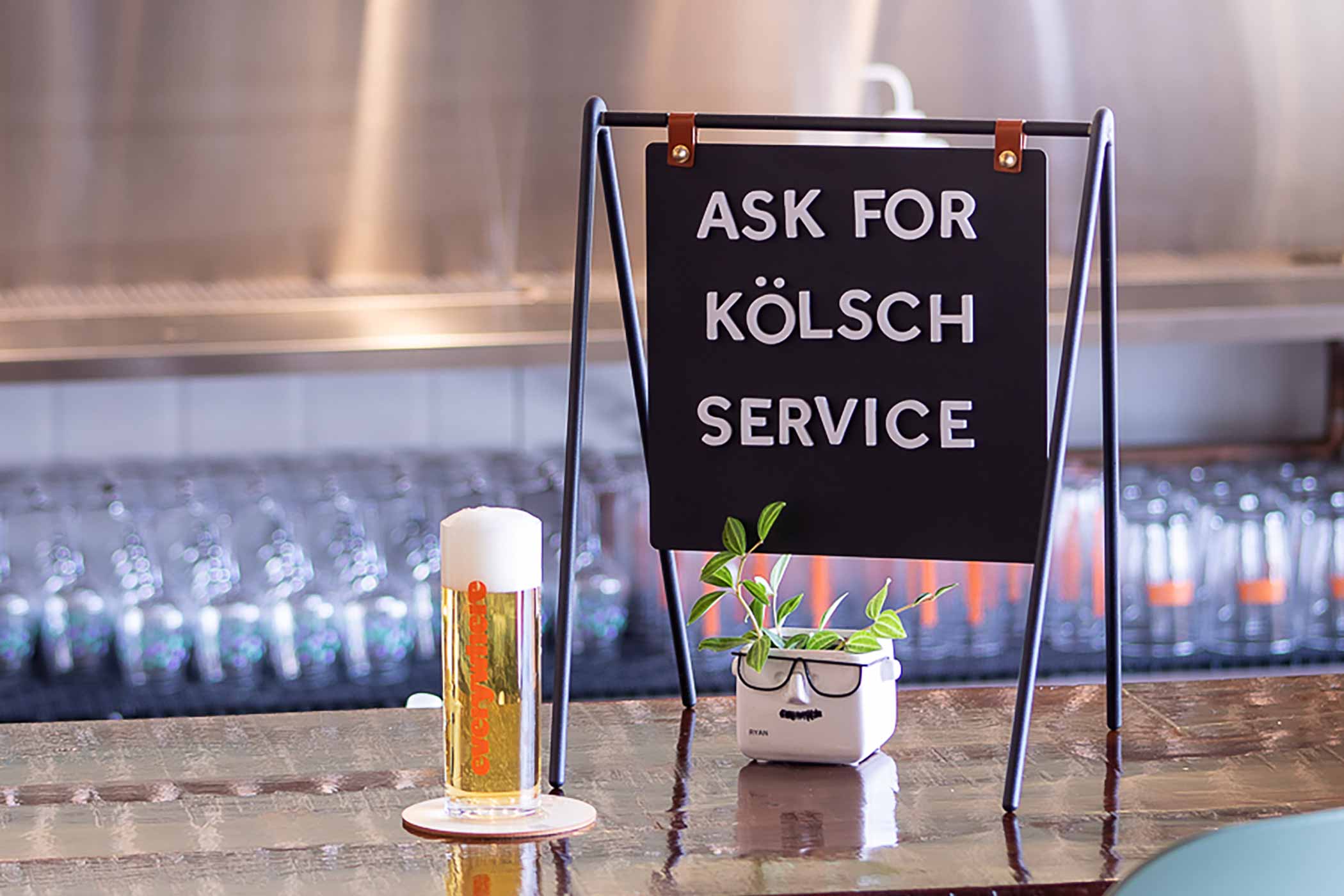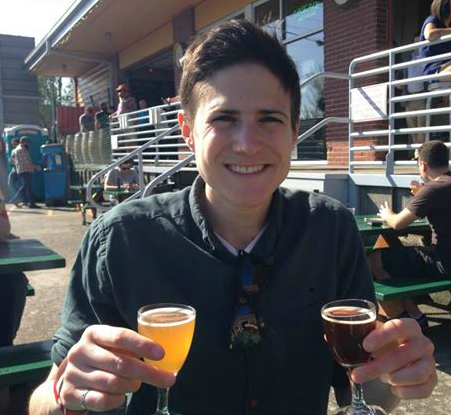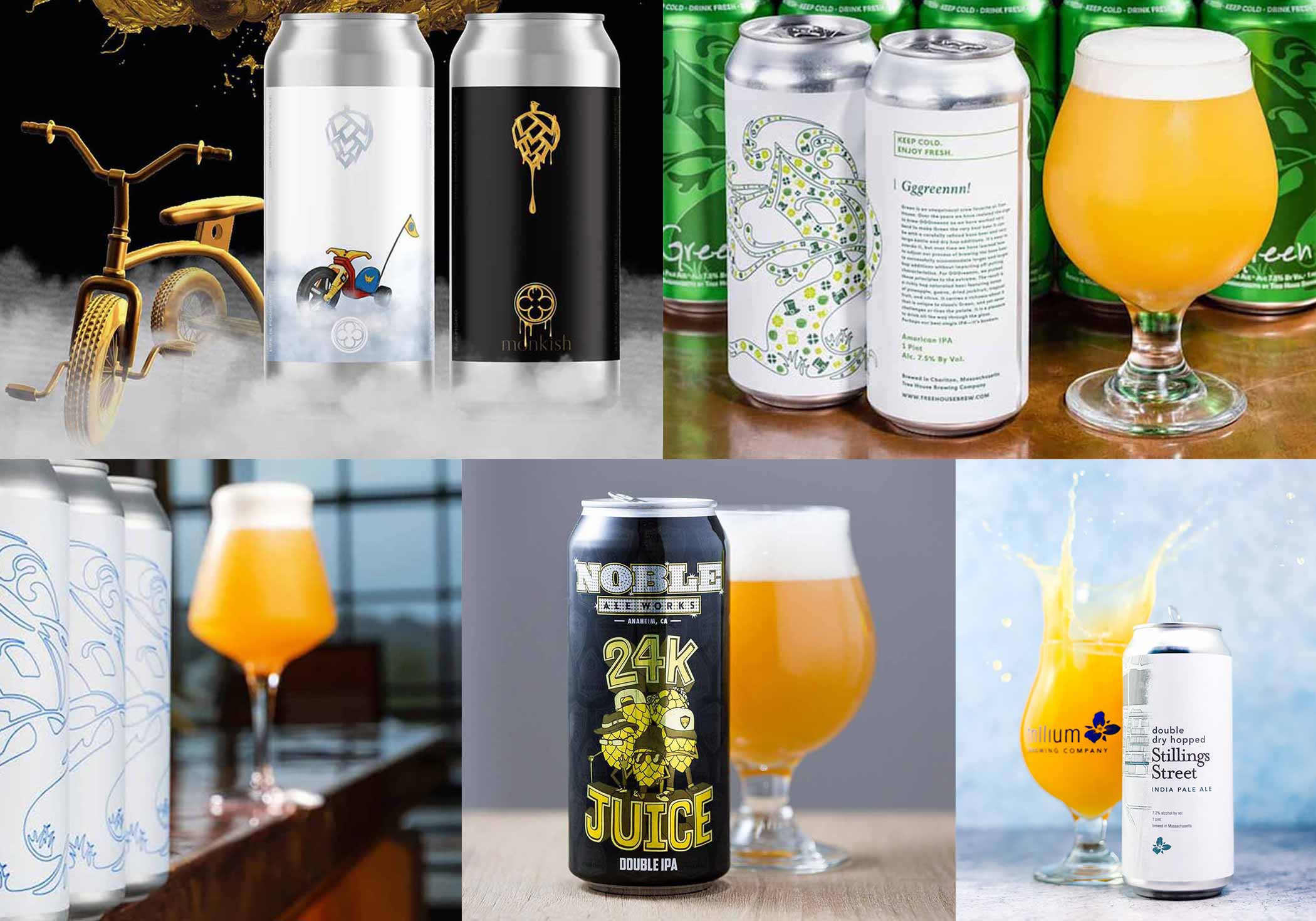Shop
What Is Kölsch Service? And Why You Need to Try It Right Now
All you can drink kölsch.
Like This? Read That...
As soon as I finished a cold, crisp gulp of my kölsch, setting the empty glass down on the table, a fresh, new one appeared.
A server roamed around with a tray filled with slender beer glasses, circling hawk-eyed for any empties. As soon as she spotted a barren glass, she scooped it up with the grace of a diving eagle, ticked a coaster, and left a fresh, full one in its wake.
It was 6 p.m. on a Thursday at Fort Point Beer Co’s Valencia taproom in San Francisco, and I was participating in my first-ever kölsch service.
Everywhere I looked, I saw full tables participating in this ritual. People drank and emptied svelte glasses of the brewery’s KSA kölsch, immediately replaced on repeat for as long as someone wanted. Those who had their fill just placed their coaster on top of the glass.
Common in the birthplace of kölsch, Cologne (Köln), Germany, kölsch service has popped up in the States, with breweries coast to coast picking up on tradition and potentially turning it into a trend.
As more taprooms start their own interpretations—both traditional and contemporary—kölsch service is something you should have on your radar.
Here’s everything you need to know.
First, An Essential Glossary for Kölsch Service
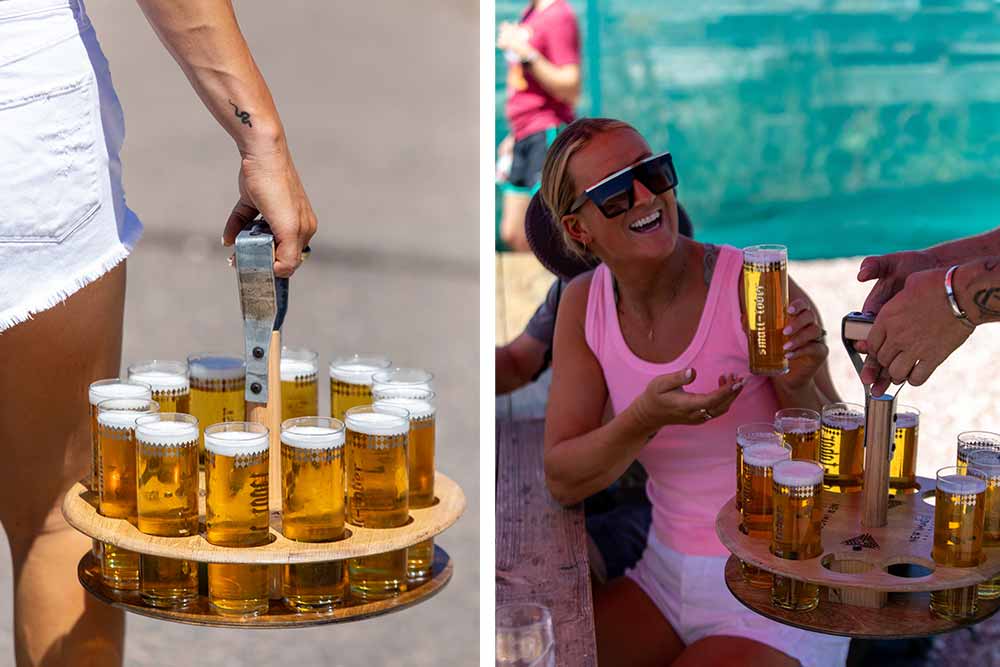
Photography courtesy of Gavin Estes | New Image Brewing
Before we get into the what of kölsch service, you should know a few terms.
Köbes – the traditional servers who roam around swiping your empties, replacing them with full, fresh glasses.
Stange – the tall, slender glasses used to serve kölsch. They often come in a 0.2L (6.7-oz) size but can also come in slightly smaller or bigger versions.
Kranz – A crown- or wreath-shaped tray full of stangen that a server carries around, looking for glasses to replace.
Deckel – The coaster marked with tallies to keep track of how many stangen of kölsch you drink during service.
Wait, What Exactly Is Kölsch?
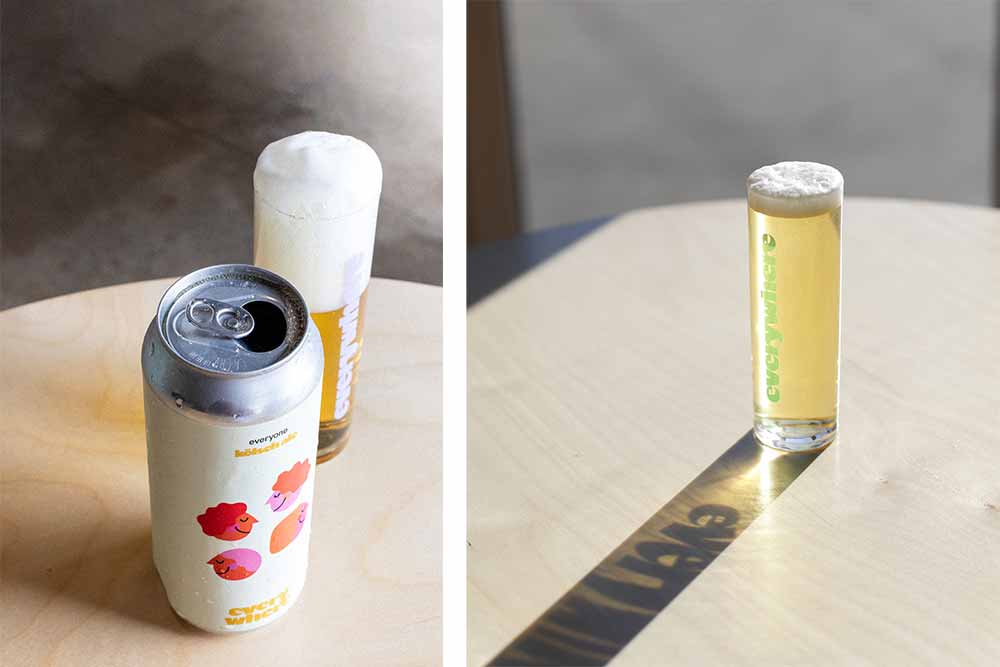
Photography courtesy of Everywhere Co-Founder Daniel Muñoz
Today, in Köln, you’ll find one beer style prevalent across the city—kölsch.
The German beer style “is an easy-drinking pale ale,” says Dovetail Brewer and Marketing and Creative Manager Jenny Pfafflin, who says the brewery has been running kölsch service since October 2019. “It has that nice water cracker malt profile, and then what makes köslch unique is the fruity, vinous quality in the aroma as well from the yeast.”
Typically featuring German malts and Noble hops, kölsch is all about the yeast, according to Everywhere Co-Founder and Head Brewer Stefan Weber, who runs kölsch service at Everywhere’s seven-seat bar. “Anybody saying they’re making a kölsch, if they’re not using a kölsch yeast, it’s not a kölsch,” he says. “That yeast is super unique. It’s honestly a little funky, it’s a little fruity, but you can’t have kölsch without it.”
Synonymous with beer in Köln, kölsch is so important to the town that, in 1986, more than twenty-four kölsch breweries banded together, signing something called the Kölsch Konvention.
The document laid out the specifications for brewing a kölsch, including that these beers must be brewed in or only a short distance from Köln.
Codified in 1997, kölsch is now protected as a geographical destination. Similar to how real champagne can only come from the Champagne region of France or real Oktoberfest can only come from one of the six original breweries in Munich, Germany. Technically, any brewery making a kölsch outside of Köln should be calling it a kölsch-style ale or something akin.
And, How Does Kölsch Service Work?
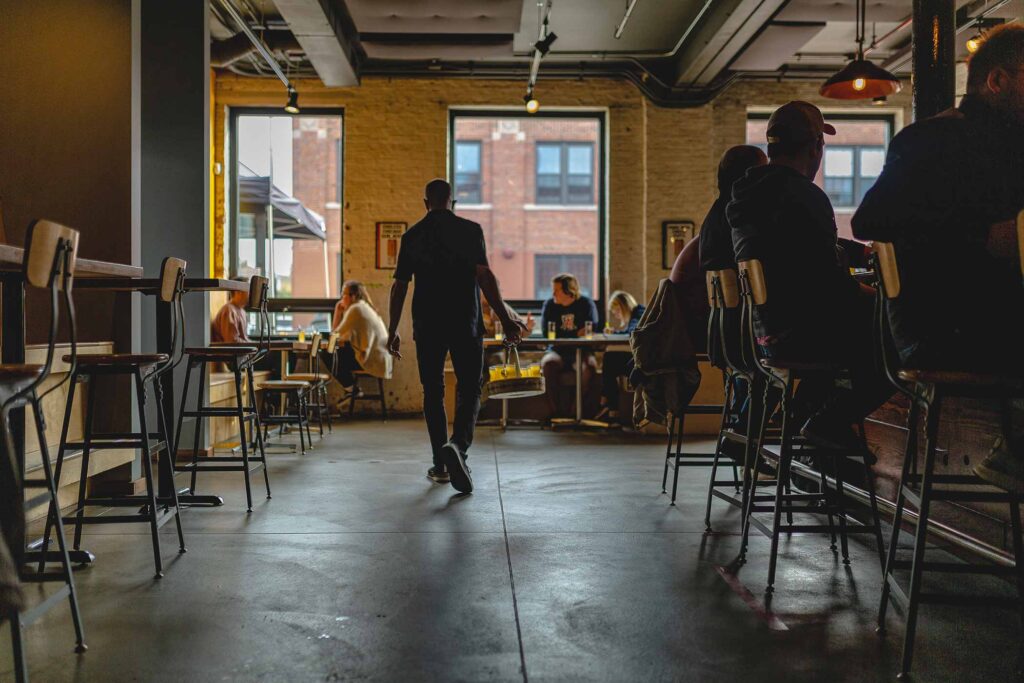
Photography courtesy of Dovetail Brewery
When you sit down, you get a single stange of kölsch and a deckel. As soon as you finish your glass, a köbes carrying a kranz replaces it with a fresh one and leaves a tally mark on your coaster.
This happens repeatedly until you’ve had your fill of kölsch. When you’re done, you simply place your deckel on top of your stange to signal you no longer want refills.
“You’re just sitting in your chair, and kölsch is freely coming,” says Fort Point Co-Founder Justin Catalana, who joined me for the brewery’s kölsch service a couple of weeks ago.
When you leave, you take your deckel to the front and pay based on the number of tally marks.
Okay, But What Is the History of Kölsch Service?
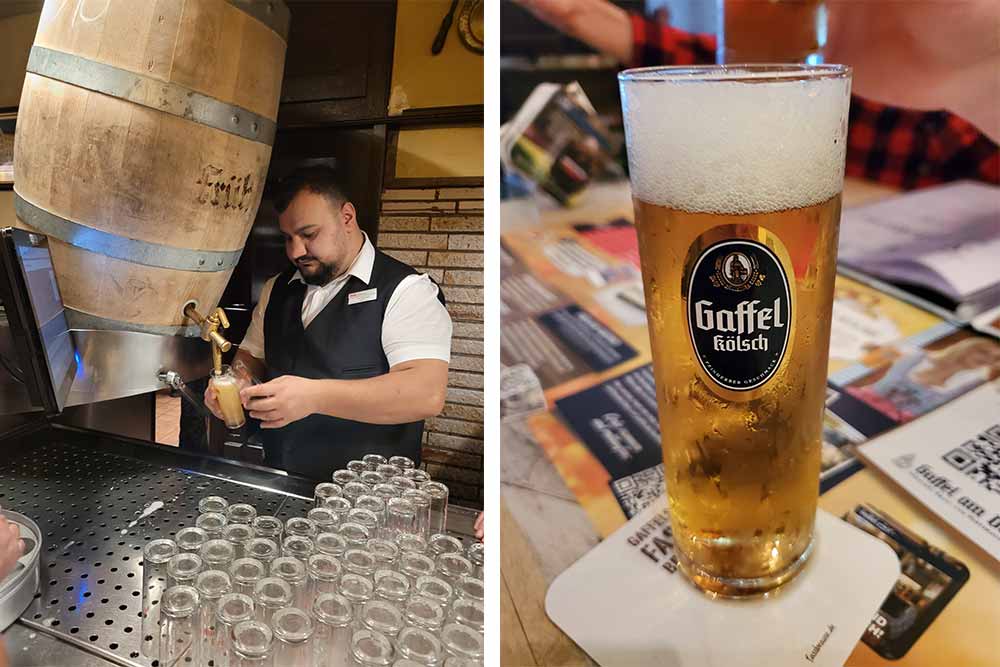
Photography courtesy of Ryan Pachmayer
Go to a brewery in Köln, and you’ll most likely find just a single beer on tap—that brewery’s version of a kölsch.
“You know you’re going in there to drink one beer, and it feels like the brewery is focused a lot on that beer,” says entrepreneur, writer, brewer, and New Image Brewing marketer-extraordinaire Ryan Pachmayer, who visited Köln last year, experiencing kölsch service firsthand. “They’re going to care about the beer, so at least you know you’re getting a good product.”
After all, breweries in Köln have produced kölsch for quite a while.
The city’s history with kölsch service stretches back centuries to when people used to pass through Köln, a waypoint for those making pilgrimages across Europe.
These interlopers, called Jakob, sometimes stayed weeks at a time, serving at the bars to make a buck.
In fact, the word köbes derives from Jakob.
Considered outsiders, these Jakob gained a somewhat mythical reputation for being mean or gruff, an interpretation of service that, according to Pachmayer, you’ll still find in Köln. Although more in jest than anything.
But Pachmayer says the theatrics aren’t the most essential part of kölsch service. Instead, it’s keeping the beer fresh and cold.
“It’s pleasant because you always have fresh beer,” says Pachmayer, who recounted his experiences in an excellent piece he wrote for Craft Beer & Brewing.
Pfafflin agrees, saying, “It goes down easy and in multiple rounds.”
A necessary quality when drinking an endless supply of the crisp, refreshing, low-ABV, almost ale-lager hybrid.
“That’s the biggest thing that stands out,” says Pachmayer. “You don’t have to worry about a line. … It seems like all those places are crowded; it’s a place where people gather, so they’re constantly going through barrel after barrel.”
How Did Kölsch Service Gain Popularity in the States?
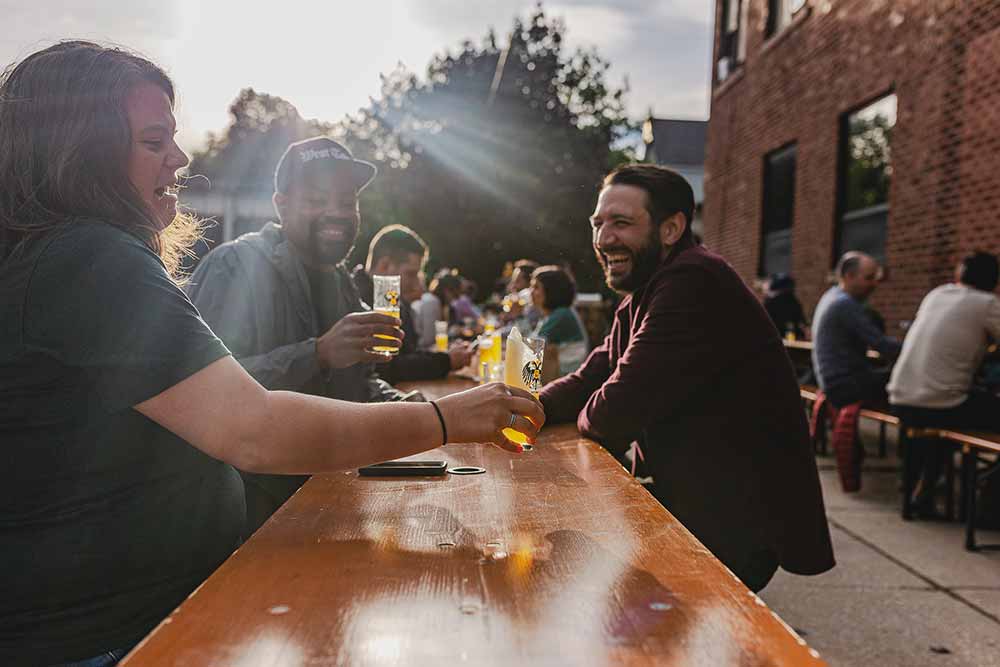
Photography courtesy of Dovetail Brewery
I first noticed kölsch service popping up at American breweries on Instagram. Those like Everywhere in Orange, CA, and Good Word in Duluth, GA, posted about starting their own versions.
Unfamiliar with the German tradition, I made a mental note to ask myself: What is kölsch service?
As luck would have it, about a month later, Pachmayer mentioned his trip to Germany, sharing his article on köslch service and giving me all the details.
The more I researched, the more breweries I learned had started their own—Dovetail in Chicago, New Image and Burns Family Artisan Ales in Colorado, and Fort Point in San Francisco, to name a few.
With iterations cropping up nationwide (not localized like in Köln), each brewery seemed to put its spin on the custom.
Nod to Tradition, Transforming Tradition, or a Bit of Both?
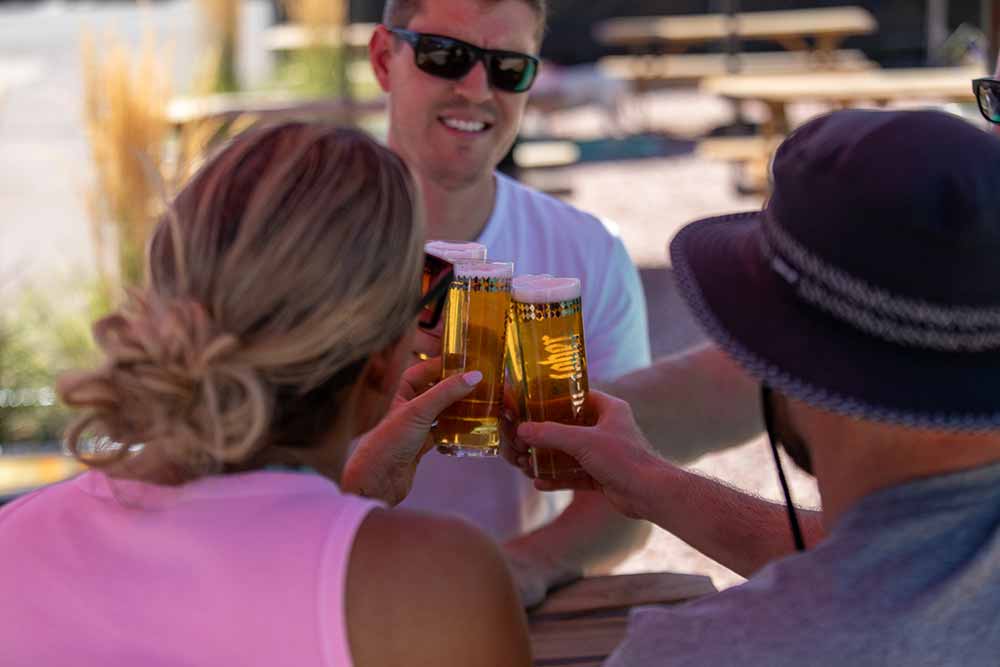
Photography courtesy of Gavin Estes | New Image Brewing
Some adhere as closely to the tradition as possible. In contrast, others adapt the ceremony to fit their service model or space limitations. Some dedicate an entire night to kölsch service without any other options; others will offer it all the time but only at the bar.
Pachmayer says that even in Germany, he experienced several slightly different versions depending on the brewery.
In the States, he says that while many breweries try to do it as traditionally as possible, he thinks most will adapt it for the customer base and their region.
“Not every place is the same, and you don’t have to recreate things exactly,” he says. “You can mold [kölsch service] to your customers or your own culture while still understanding [the traditions].”
Nod to Tradition
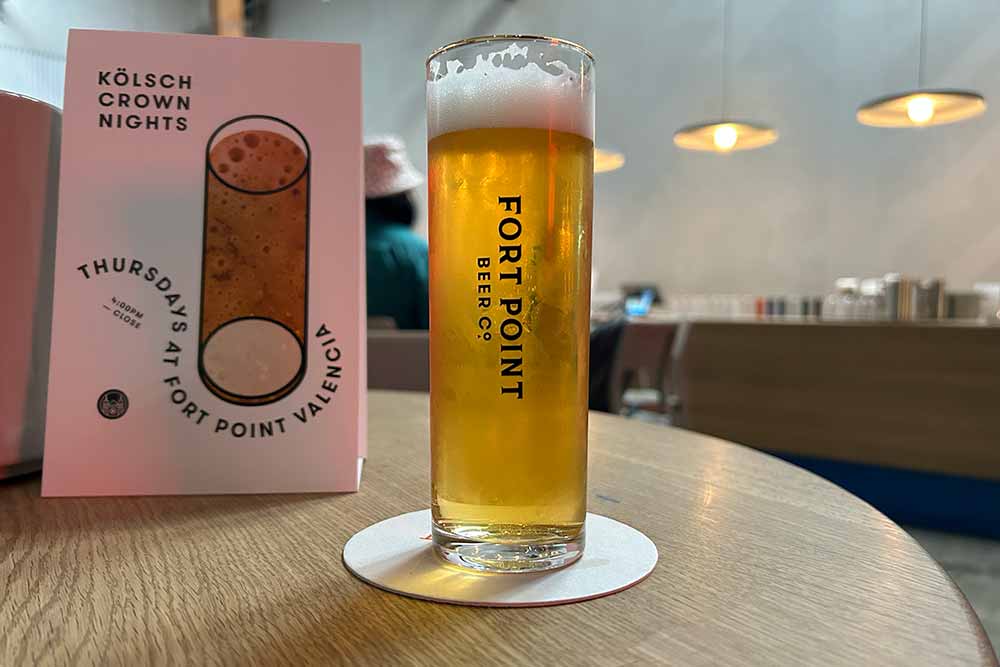
Photography courtesy of Grace Weitz | Hop Culture
At Fort Point, Catalana says they’ve toyed with starting kölsch service for a while. Mostly because of the popularity of their flagship kölsch KSA (how many breweries do you know that launched with a kölsch front and center?).
Catalana says, according to scan market data from Circana (formerly IRI), Fort Point sells more domestic kölsch than any other brewery in the U.S.
“This has been a thing we’ve wanted to do for a very long time, and finally, we’re like, we just need to figure out the mechanics behind it,” says Catalana.
Without spending time in the German city, the team researched, “How does this actually work in Cologne? How do they actually do it?” says Catalana.
Fort Point Director of Marketing Christina Shatzen adds, “[We wanted to] stay as true as we can to what it feels like when you’re doing this in Cologne.”
Following a pretty traditional model, Fort Point has been experimenting with presenting kölsch service one day a week for the last four weeks in August.
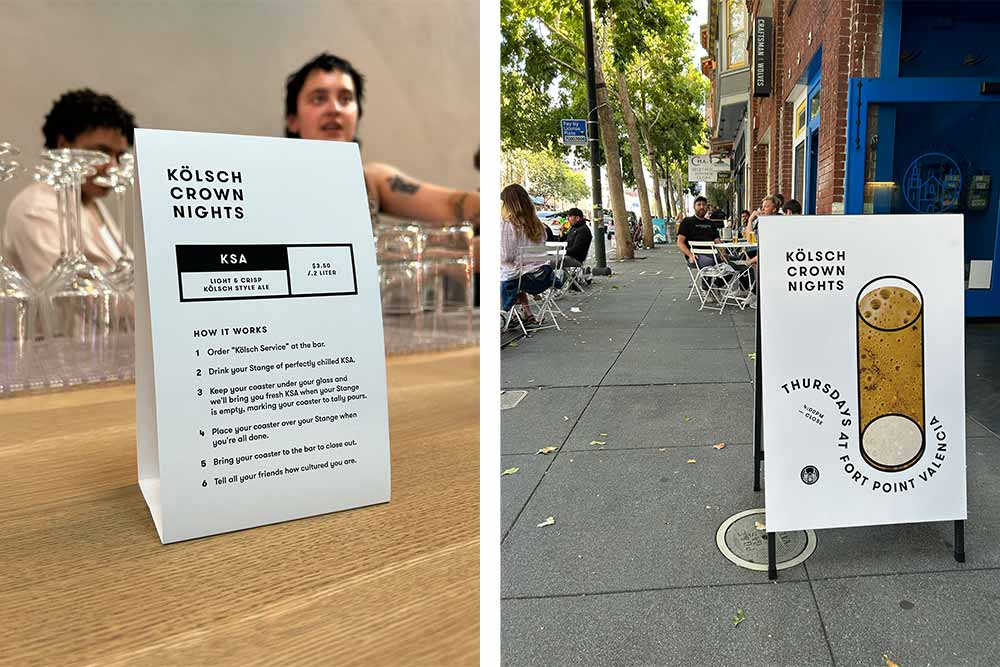
Photography courtesy of Grace Weitz | Hop Culture
Every Thursday, you can participate if you stop by their Valencia taproom. While Fort Point does keep all its other beers available for purchase, on these nights, you can order kölsch service at the bar and follow these rules:
1. Order kölsch service at the bar.
2. Drink your stange of perfectly chilled KSA.
3. Keep your coaster under your glass, and they’ll bring you fresh KSA when your stange is empty, marking your coaster to tally pours.
4. Place your coaster over your stange when you’re all done.
5. Take your coaster to the bar to close out.
Much like how you would do kölsch service in Cologne. In fact, Catalana says a couple of people from Cologne showed up at the brewery interested, approving of how the brewery handled kölsch service.
Similarly, Dovetail in Chicago sticks closely to tradition. Like Fort Point, they pick a particular night, but during kölsch service they only serve kölsch.
About three times a year, Pfafflin says they do traditional kölsch service. “There is no other beer served at that time,” she says. “You check in, get a coaster, and [kölsch] is the only thing you get [all night].”
Pfafflin says since Dovetail brews continental European styles with traditional methods, the brewery wanted to adhere to convention.
“Kölsch is much more than just a beer style; there is also a culture around kölsch beers, so it was important for us to use the traditional [brewing] methods and service traditions,” she says.
Serving out of the standard 0.2L stange, Dovetail also trained all of its servers to be köbes for the night, carrying around kränze they’ve sourced from Germany.
Albeit, Pfafflin says they forgo the typically gruff behavior, bringing more of a Chicago style to the service. “I think our servers are a little more kind!” she exclaims. “You’re right under the L tracks. You’re not in the middle of Köln … so we take a more relaxed approach. We’re not trying to be a German-style brewery in Chicago; we’re just a brewery in Chicago that happens to make German-style beers.”
Pfafflin says people can stay and drink as much kölsch as they want, “and on the way out, you check out, and add up the marks.”
Dovetail’s kölsch service is about as traditional as it gets. Although, they do add a simple twist.
A Bit of Both
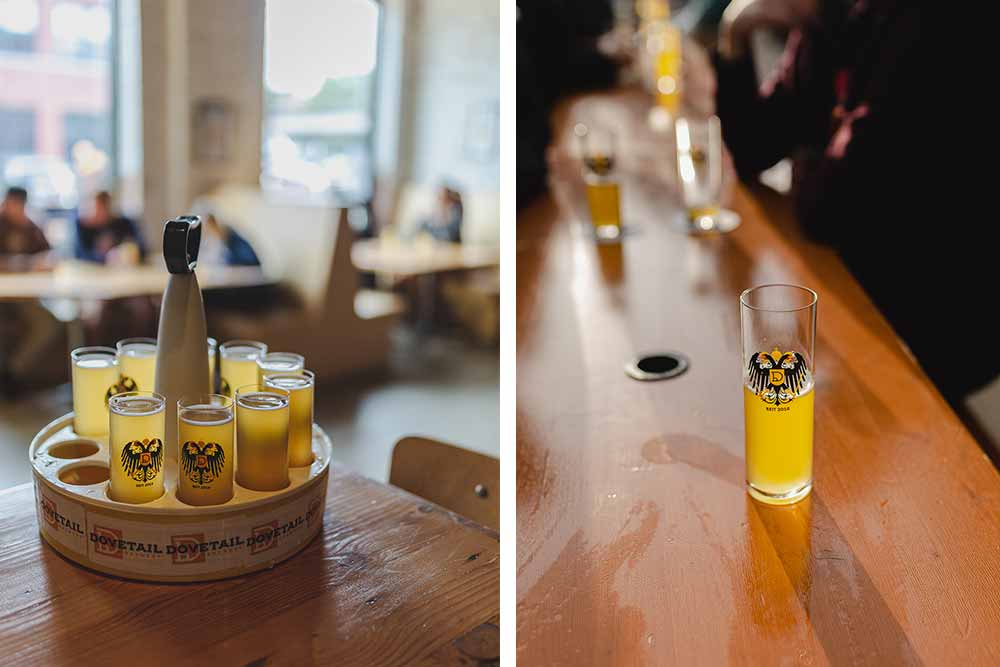
Photography courtesy of Dovetail Brewery
In addition to dedicated nights, Dovetail lets you order a full 11-round or 18-round kranz of kölsch any time of the year.
“It’s almost like a bucket of beer or a pitcher served in a traditional way,” says Pfafflin.
Dovetail isn’t the only brewery to bring a hybrid historic-modern approach to kölsch service.
In Orange, CA, Everywhere sticks to the basics but finagled the format to fit their service model.
Like Fort Point, without table service, you only order at the bar at Everywhere. But where Fort Point presents kölsch service only one night a week, Everywhere took the opposite approach.
You can order kölsch service anytime they have their Everyone kölsch on tap. You’ll get kölsch in a stange and a coaster to mark your number, the whole nine yards. But the twist?
You can only get kölsch service at the seven-seat bar. It’s not a one-night event.
“If kölsch is on, customers know that we’re running service,” says Everywhere Co-Founder Daniel Muñoz, who first learned about kölsch service after watching an episode of Anthony Bourdain’s Parts Unknown in Cologne.
But you have to nab one of those seats at the bar. “For us, we didn’t want to think of it as an event,” says Muñoz. “We wanted it to be like, you can do this every day. … You do get times where people are waiting at the bar, which is cool, too, because that’s the best interaction with the front of the house.”
Transforming Tradition
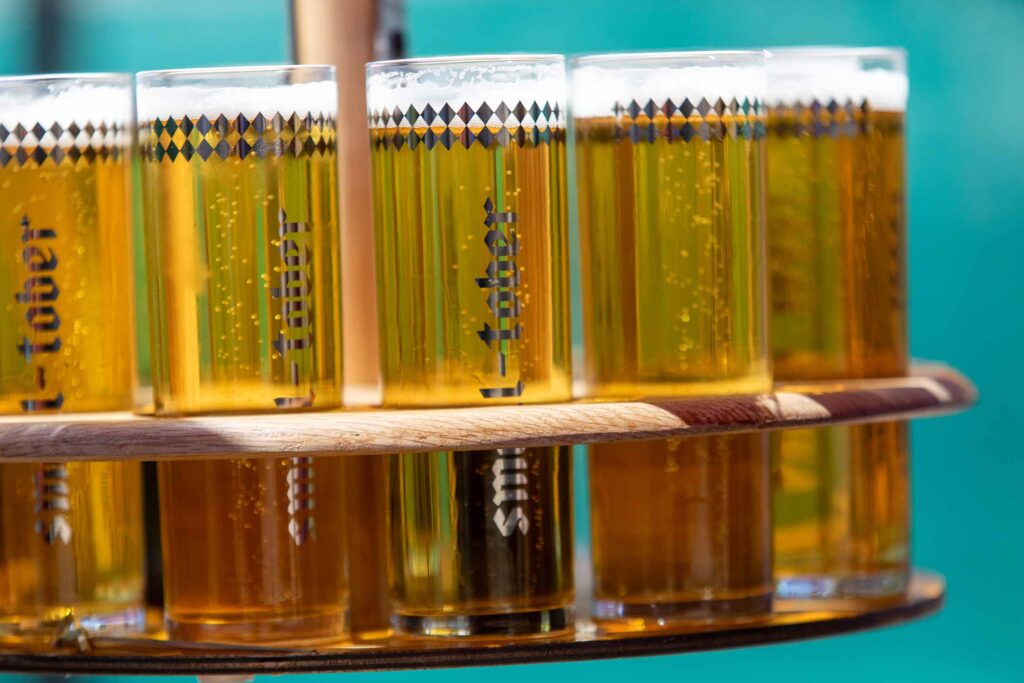
Photography courtesy of Gavin Estes | New Image Brewing
Still others take more liberties.
Last fall, before Pachmayer even went to Germany for the first time, he and New Image Co-Founder Brandon Capps had an idea: What if we took a different approach to Oktoberfest?
Instead of celebrating the tradition with a raucous party, what if they made a really low-ABV Festbier, giving people small 0.2L pours in kölsch glasses?
“Let’s make it about socializing … but if people want to drink twelve of them, that’s fine,” says Pachmayer.
In a nod to kölsch service, New Image commissioned an artist to make kränze, and they ordered their own stanges.
Sure, they weren’t actually serving kölsch, but they captured the essence of kölsch service—the camaraderie, the small portion sizes, the idea of serving fresh beer constantly.
People loved it so much that New Image expanded Small-Tober from one Saturday to five this year. Calling it a “lager service,” New Image will give you a coaster when you walk in if you want to participate. For $16, you get four 0.3-liter (a little over 10 ounces) pours of different lagers—Small-Tober, a helles, a pale lager collab with Bierstadt, an Italian pilsner, or a Mexican blue corn lager.
Pachmayer says depending on the weekend you participate, you’ll have two rotating options.
“Basically, you have a glass, you finish your glass, and we’ll replace it with one of those two beers,” he says. “Your choice.”
A New Image server will walk around like traditional köbes with a tray full of the two available lagers. When they see an empty glass, they’ll ask the customer which beer they want, swap it out, put a checkmark on their coaster, and move on to the next.
“It’s really simple,” says Pachmayer. “There are no lines; there’s no getting up.”
Why Even Start Kölsch Service?
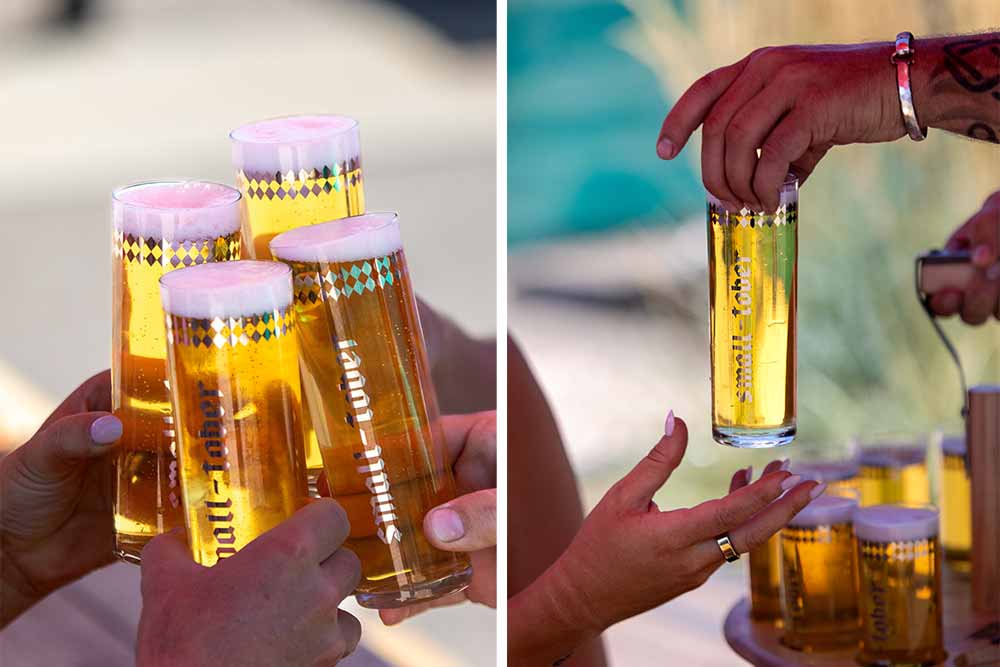
Photography courtesy of Gavin Estes | New Image Brewing
Having been to Franconia and planning to return later this year, Pachmayer says he noticed something during his travels. “Beer is really affordable, and it’s very simple, too,” he says. “At the regular, typical lager breweries, they only offer one or two beers, and their service is just very simple—you get this size glass, you tell me what you want, I pour your glass, it’s done.”
Pachmayer says at New Image, which normally offers twenty-some taps of highly specialized IPAs or barrel-aged beers, they’ve noticed customers talking more about affordability and simplicity.
“How is beer so affordable in Germany?” he asked himself. During his travels, he realized German breweries only focus on one or two beers, offering them in smaller, simpler formats.
“We have so many choices at American brewers that [kölsch service] is almost like this beauty of simplicity,” he says. “You could just go in and be like, I’m drinking kölsch. … It’s neat not to wade through a menu or decide between three or four different things.”
New Image’s Small-Tober aims to bring great, affordable lager to its customers in a fun, celebratory way.
For Fort Point, kölsch service “feels like a different way of consuming something,” says Catalana.
And while it’s early days (we visited on Fort Point’s third night of hosting), the kölsch service has already triggered conversations.
“You see someone with a different glass, and something special is happening, and you’re like, oh, wait, what’s that table doing? I want that too,” says Shatzen. “It’s kind of like drinking beer out of a boot. You’re still just drinking beer, but it’s something different that you’re like, wow.”
Similarly, at Dovetail, which hosted its first kölsch night four years ago, Pfafflin theorizes that the event has been a great way for people to connect, especially after the isolation of the pandemic. “It was a very social night for everyone when we weren’t being social for three or four years,” she says. “It’s a way of making a human connection again,” she says.
Likewise, at Everywhere, kölsch service became “this really interesting way to create a unique environment in our tasting room, engage with customers, and just have a little more fun,” says Muñoz.
Weber adds that kölsch service has been a fun way for customers to interact with the bartender differently. “It brings this new form of engagement that isn’t your average just-order-a-beer-and-we-bring-it-to-you,” he says. “In a way, you could see it being less engaging because you don’t even have to ask for it; it just comes, but it actually gets the bartender in front of you more and creates new conversations.”
Muñoz notes that the first time they ran kölsch service, they slammed through kölsch keg.
For the most part, Muñoz and Weber say folks drink three to four 0.2L glasses of the brewery’s 4% ABV kölsch. But a few of the regulars have gotten a little competitive. “We had some people get up to, like, twenty,” says Weber, emphasizing they don’t encourage heavy drinking, but that it does happen.
Still others will keep their kölsch coasters to show how much they drank over time. “They put down like forty-five kölschs over the last thirty-five days!” he says.
Although not always available, Everywhere’s Everyone kölsch has become the only beer they’ve brewed more than once to keep up with the popularity of kölsch service.
To New Image’s point of affordability, Everywhere also includes special pricing on their kölsch, offering it for $4 per stange, a dollar less than other beers on their tap list.
“This is the beer that when somebody just comes in and just wants to have a couple of beers after work, they’re going to go like, oh, cool, kölsch, she’s on, I can grab a couple of those, and it’s a little bit more affordable,” says Muñoz. “People just seem to love it, and they pound through them.”
Will More American Breweries Adopt Kölsch Service?
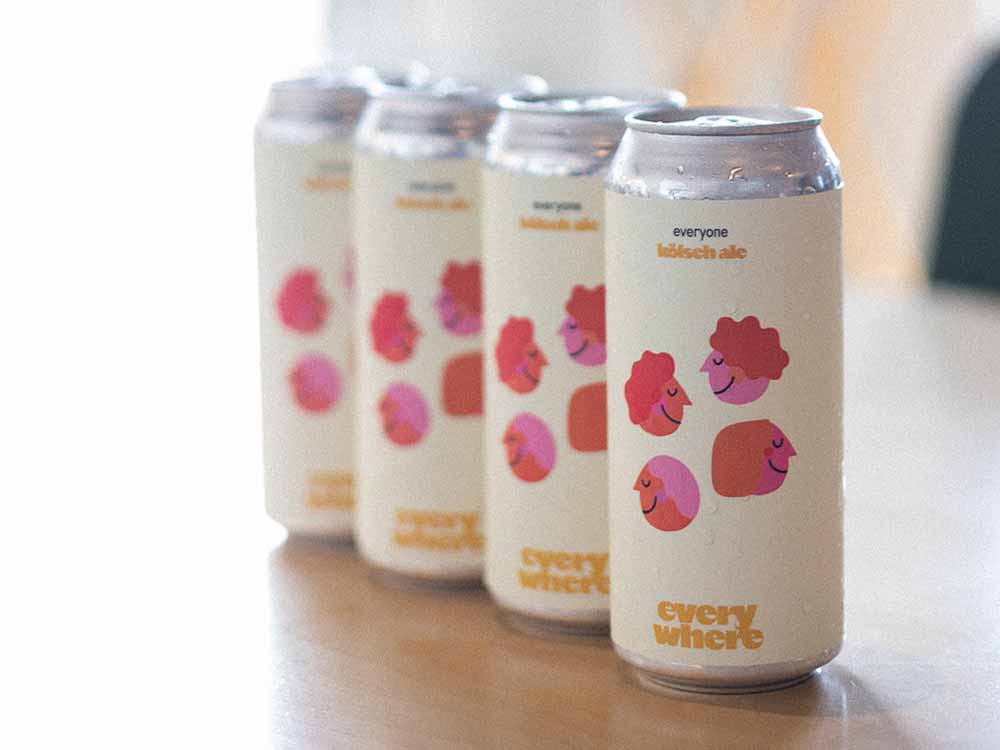
Photography courtesy of Everywhere Co-Founder Daniel Muñoz
All signs point to yes!
The benefits of köslch service tick more boxes than the deckel of a thirsty kölsch drinker.
✅Fun, engaging, social
✅Affordable and approachable
✅Fresh, cold beer in constant supply
✅A new educational event
✅A new way to attract customers
“It’s tough out there to be a brewery these days, so how do you bring people into your taproom,” says Pfafflin. “You need to go beyond just making good beer. … And what can you do in your taproom that adds to the experience of drinking beer?”
Kölsch service is one way.
“I think it’s really cool, and I hope more breweries explore these types of different service traditions because it only adds to the fun of going out and drinking beer,” says Pfafflin.
While Catalana and Shatzen at Fort Point say they’ll see how their early kölsch services perform, tweaking for the future, New Image seems comfortable keeping the tradition to a one-time-a-year event.
“People are having a blast here; it seems to be working; it’s super easy to do, so I think even more breweries will continue to do [kölsch] service,” says Pachmayer.
Muñoz agrees. “That’s the beauty of it; it’s all pretty simple,” he says. “It’s just supposed to be a really beautiful, simple experience.”
During that Thursday night at Fort Point, we happily put away four glasses of fresh KSA. The beer stayed cold, the beer stayed fresh, and we left already chattering excitedly about when we could come again.
Or where else we could go to try the next kölsch service.
Try These Kölsch Services Nationwide
We’re working our way across the country from the West Coast to the Mountain West to the Midwest to the South to the Mid-Atlantic to the Northeast, showcasing all the kölsch services we discovered or have been told about from others in the industry.
We’d love to keep building this list. Do you know of a brewery doing kölsch service that we don’t list here? Slide into our DMs (@hopculturemag) and let us know. We’ll add them here!
Everywhere
Orange, CA
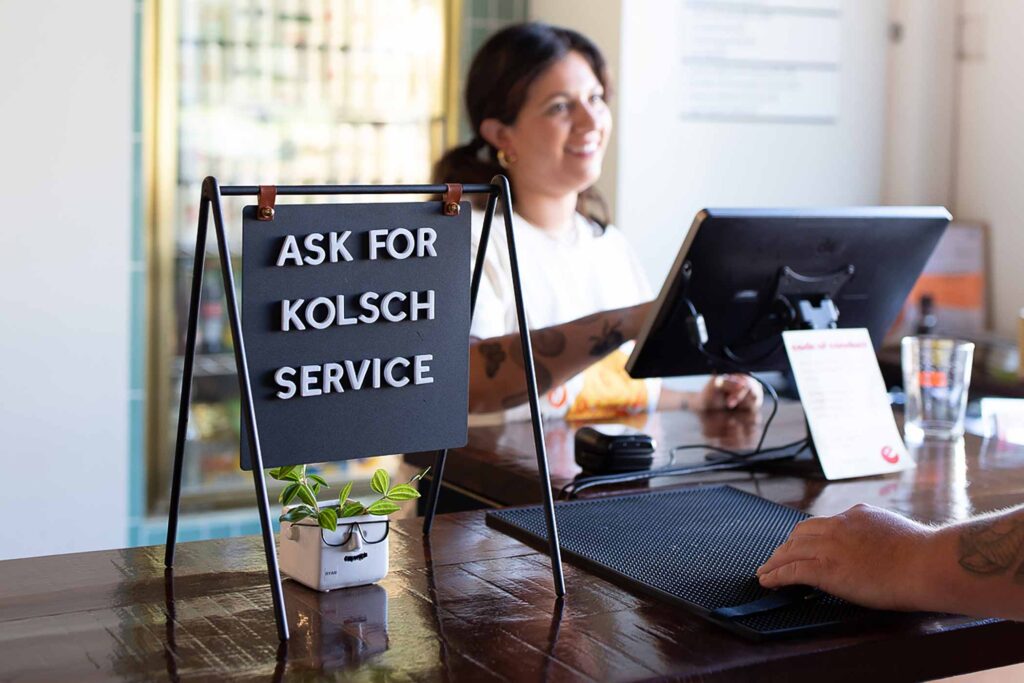
Photography courtesy of Everywhere Co-Founder Daniel Muñoz
As long as Everywhere has its Everyone kölsch on tap, and you can get one of the seven seats at the bar, kölsch service is on at this Southern California-based brewery. A good indication that kölsch service is in swing? A sign at the bar says, “Ask For Kölsch Service.”
For $4, you’ll receive a stange of Everyone kölsch ale. Made with 100 percent German ingredients, Everywhere’s kölsch includes German-grown and malted barley and some Barke® Pilsner malt that “just adds a little bit more richness,” says Weber. “We also use some wheat to give it a bit of breadiness.”
Featuring Perle hops (“We go pretty heavy with them,” says Weber), Everyone drinks a bit more assertively. “It’s not bitter … [but] it gives a little more balance to me, making it more drinkable,” says Weber.
Fort Point Beer Co.
San Francisco, CA
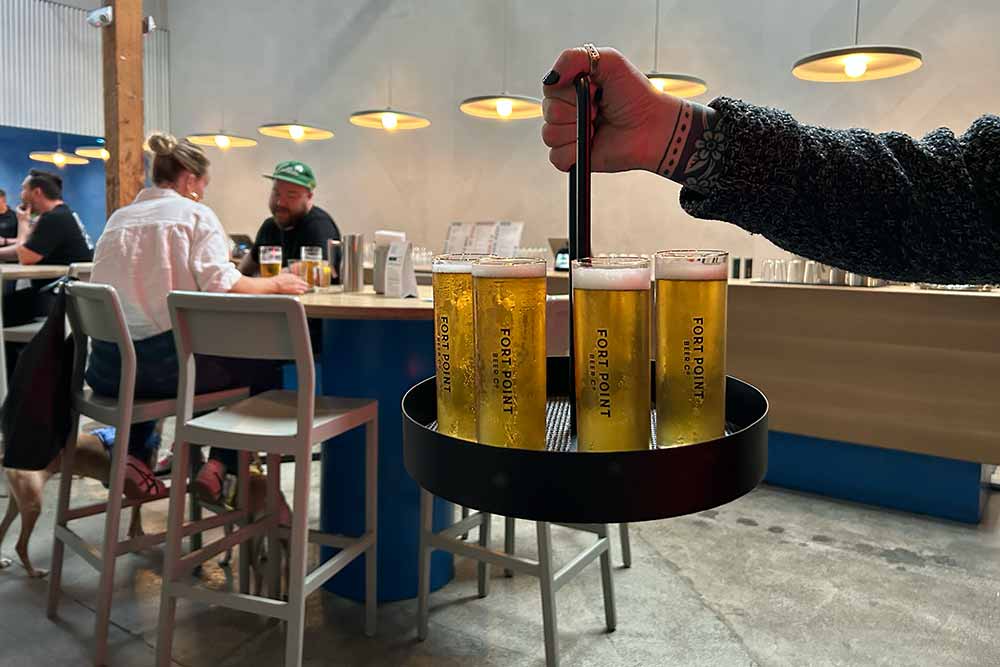
Photography courtesy of Grace Weitz | Hop Culture
Started very recently, Fort Point’s kölsch service runs every Thursday through August. Featuring Fort Point’s flagship KSA kölsch, the brewery’s interpretation keeps things pretty traditional.
You order kölsch service at the bar, and they give you a 0.2L stange and a coaster; you grab a table and then just relax and drink. Anytime you drain your glass, a server comes around to take it away and replace it with a full one immediately.
Inspired by kölschs from Cologne, KSA uses German malts but differs slightly with the addition of American hops. A sort of Californian take on a kölsch, KSA is Fort Point’s best-selling beer and the highest-performing craft kölsch in the country, according to Catalana.
New Image Brewing
Arvada, CO
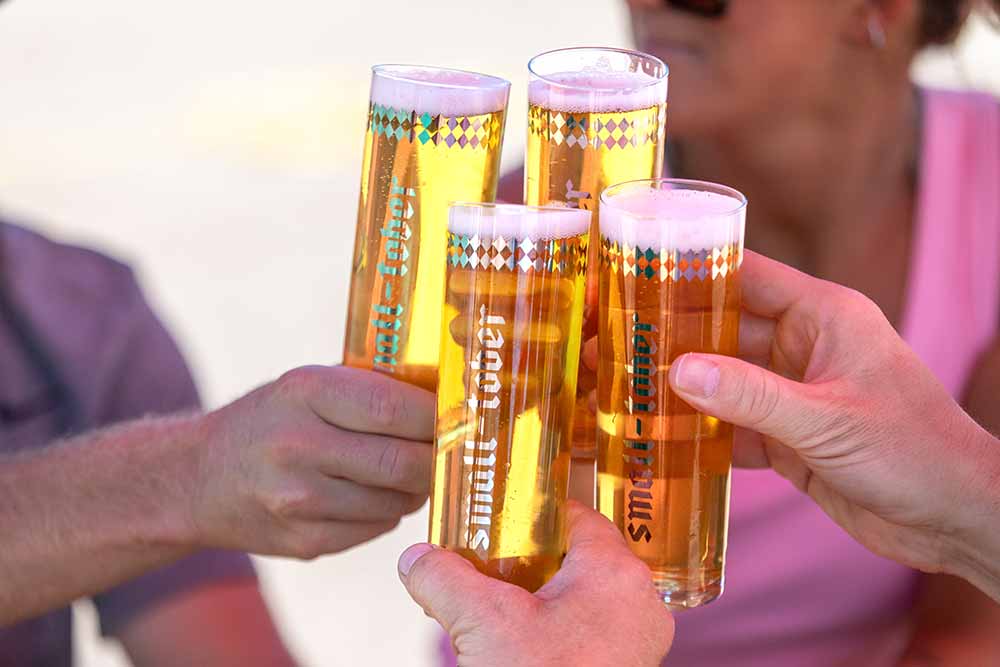
Photography courtesy of Gavin Estes | New Image Brewing
More of a lager service than a straight-up kölsch service, New Image will feature this Cologne tradition for only five Saturdays this fall from September 9th through October 7th.
Called Small-Tober, the event will allow you to purchase a $16 coaster that gets you four glasses from roving köbes carrying around handmade kränze from artist Zach Wessel (@wesselanddaughters), who fashions the traditional serving trays from used barrels.
Although not actually offering kölsch, New Image’s lager service will include the low-ABV Small-Tober—”a baby Märzen,” as Pachmayer calls it—all five weekends, along with rotating lagers. Options could potentially include:
1. Do Less: A helles with local Troubadour Malt that’s traditionally decocted and naturally carbonated.
2. Premium Pils: An Italian pilsner that’s more traditional, according to Pachmayer. “It’s very lightly dry-hopped and not super bitter,” he says. “It’s almost slightly rounder, so not an American interpretation of Italian pils.”
3. Now Beer: A Czech pale lager collab with Bierstadt Lagerhaus. “It’s like a low 5% ABV Dortmunder,” says Pachmayer. “Just a good, fresh, well-made pale lager to drink.”
4. Tigre Especial: A Mexican lager with local blue corn from Troubadour that recently scored a 99 from Craft Beer & Brewing in a blind taste test. “A bunch of people came in asking about it. … [And] it’s our production team’s favorite beer too, so it seemed like a great reason to make it again,” says Pachmayer.
Overall, Pachmayer says, “I think everything is super drinkable, super approachable, not overly heavy, not overly malty; just good, generally pale lager beer.”
Fritz Family Brewers
Niwot, CO
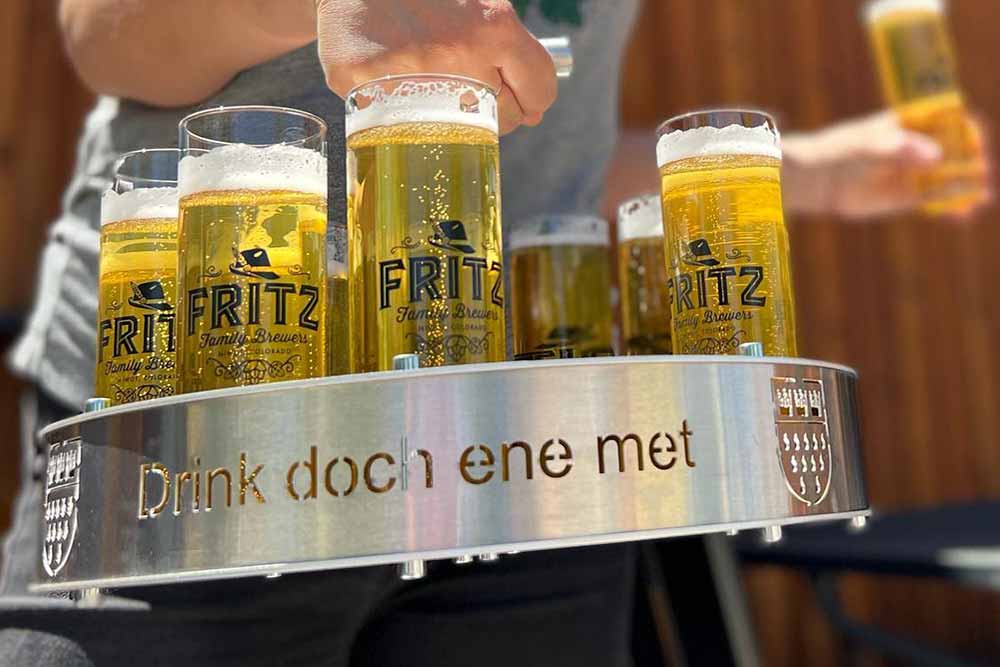
Photography courtesy of Fritz Family Brewers
Perhaps one of the first to start kölsch service in the Denver area, Fritz Family Brewers Co-Founders Kelly and Cory Buenning, fell in love with the custom after trying it at a bar called the Holy Grale in Louisville, KY.
When Cory decided to brew his own kölsch at Fritz Family Brewers, Kelly suggested starting a kölsch service night, too.
The Niwot-based brewery started running its own in May 2022.
Pachmayer calls Cuckoo For Kölsch his favorite kölsch-style ale in the area.
“Fritz’s [kölsch] would fit right in Cologne; it was a phenomenal kölsch,” says Pachmayer, revealing he visited the brewery, a 40-minute drive away, three times just to drink that beer.
4 Noses Brewing Company
Broomfield, CO
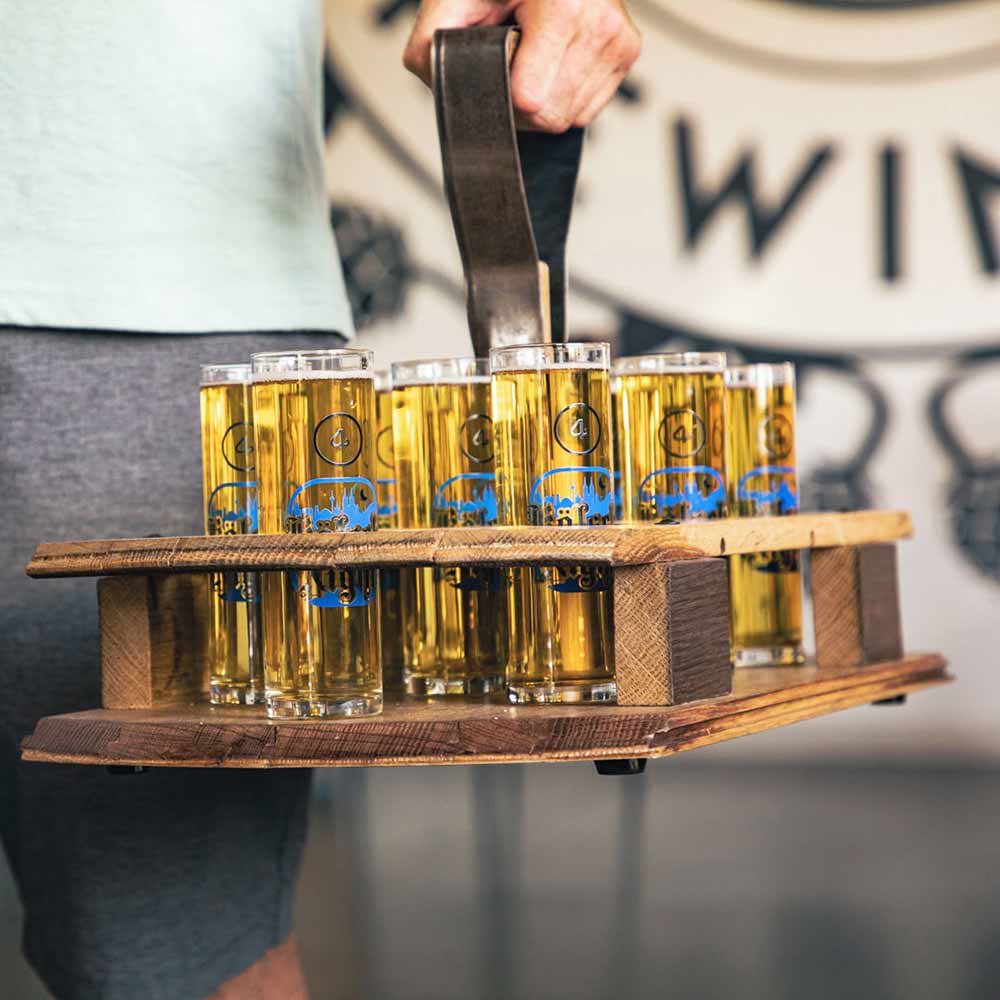
Photography courtesy of @4nosesbrewingcompany
Pachmayer also turned us onto 4 Noses kölsch service. In fact, New Image first found out about local kranz-maker Zach Wessel because he made kölsch serving trays for 4 Noses first.
The Broomfield-based brewery started weekly Wednesday night kölsch service in August 2022. Similar to Muñoz and Weber at Everywhere, 4 Noses Owner Tommy Bibliowicz discovered the custom after watching Anthony Bourdain’s episode of Parts Unknown in Cologne.
At 4 Noses, you simply let the bartender know you want to participate, get a slim glass of 4 Noses Kölsch Night, and settle in for a night of kölsch and fun.
“It was a solid beer; it would fit in in Cologne,” Pachmayer told us.
Burns Family Artisan Ales
Denver, CO
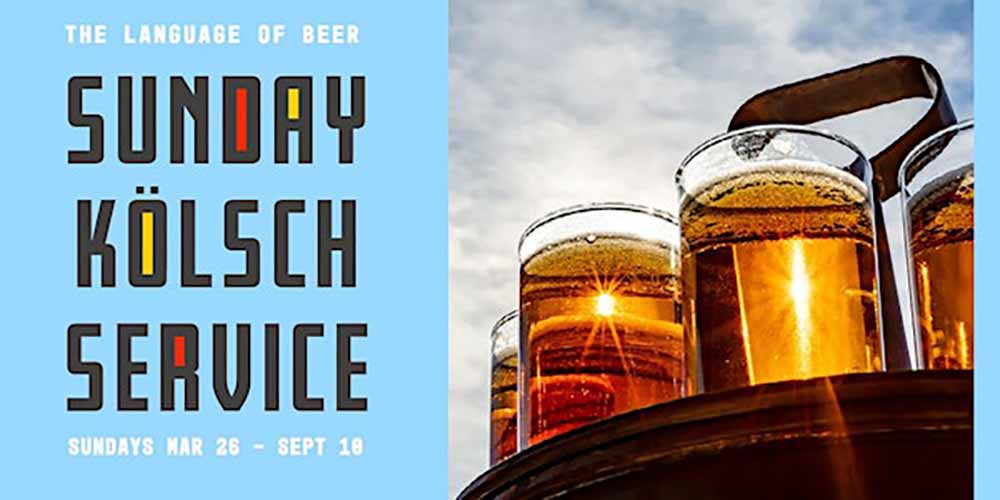
Graphic courtesy of Burns Family Artisan Ales
Colorado is awash in kölsch services, with Burns Family Artisan Ales getting in on the action recently, as well. They’ve been running kölsch service every Sunday from 1 pm-7 pm since March 26th, 2023, and plan to continue through September 10th of this year.
Burns Family’s version appears very traditional with its kölsch served in 0.2L stangen, replaced sight unseen by köbes carrying kränze. Participants get a coaster that’s ticked up with each beer they drink. When you’re done, put the coaster on top. And when you want to leave, take the coaster up to the bar to close out.
Pachmayer visited on opening day, thoroughly enjoying the brewery’s kölsch and service.
Dovetail Brewery
Chicago, IL
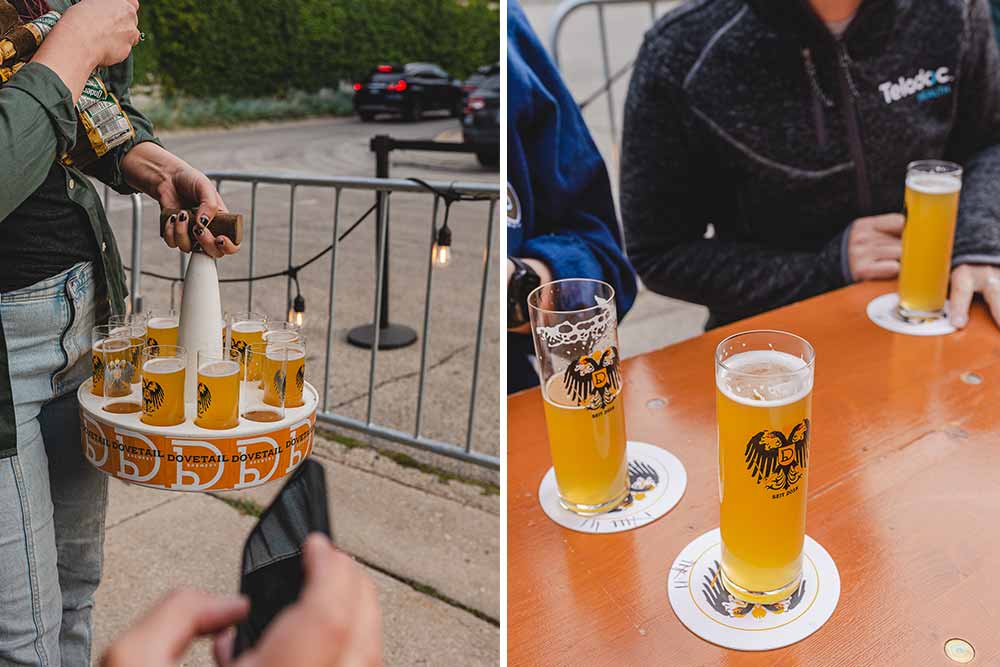
Photography courtesy of Dovetail Brewery
Keep on an eye on their Instagram (@dovetailbrewery) for the next full-service kölsch night. If not, stop by any time with a bunch of friends and order the brewery’s 11-round or 18-round kranz full of stangen of Dovetail’s Kölsch.
“It’s a pale ale with mostly pilsner malt, and we put a little wheat in there as well,” says Pfafflin, noting Dovetail uses a kölsch yeast and ferments for four weeks.
Featuring Saphir, Saaz, and Strisselspalt hops, this kölsch has a really nice floral character. “We do a flame-out addition on our hops, so it’s the very last addition that captures all these more delicate hop oils,” says Pfafflin.”It’s bitter enough to keep it interesting but easy [enough] to go down in multiple rounds.”
Hopewell Brewing Co.
Chicago, IL
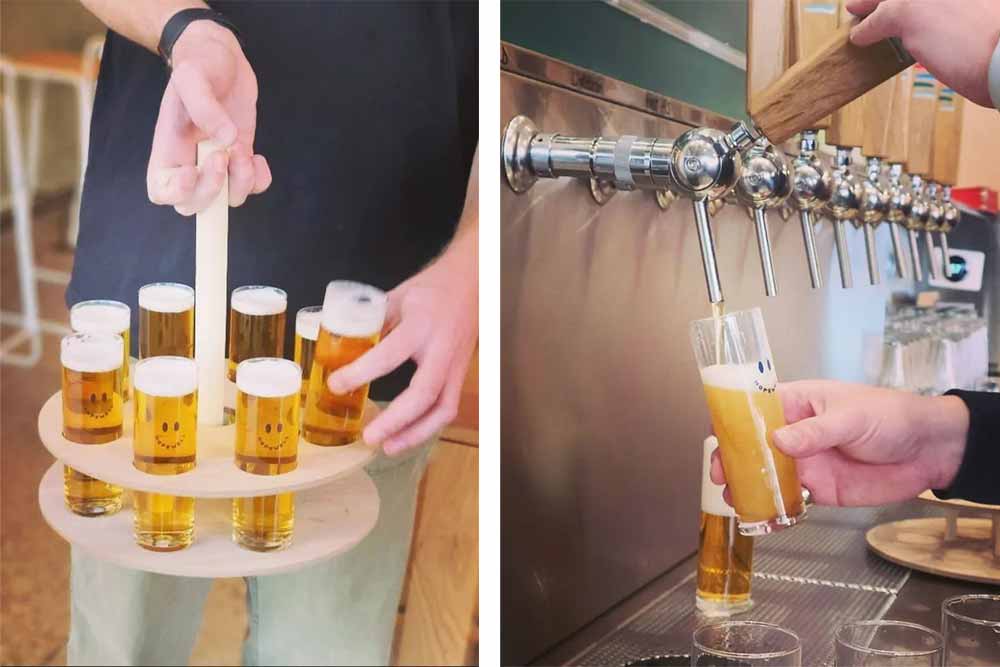
Photography courtesy of @hopewellbrewing
Pfaffin noted that she’s seen other breweries around Chicago start kölsch service. For instance, Hopewell Brewing hosted its own interpretation to celebrate the release of its first kölsch, Cold Call. Debuting in March 2022, on a Tuesday, Hopewell Co-Founder Samantha Lee told the Chicago Tribune the kölsch-only night had the brewery packed like a Saturday.
Based on its popularity, the kölsch service became a daily/nightly occurrence at Hopewell.
“You can sit at their bar, and you’ll get a coaster, and they keep serving you kölsch,” says Pfafflin. “I thought that was an interesting way to [do it]. … You don’t have to wait for a special day or event to participate in this service.”
Double Clutch Brewing Company
Evanston, IL
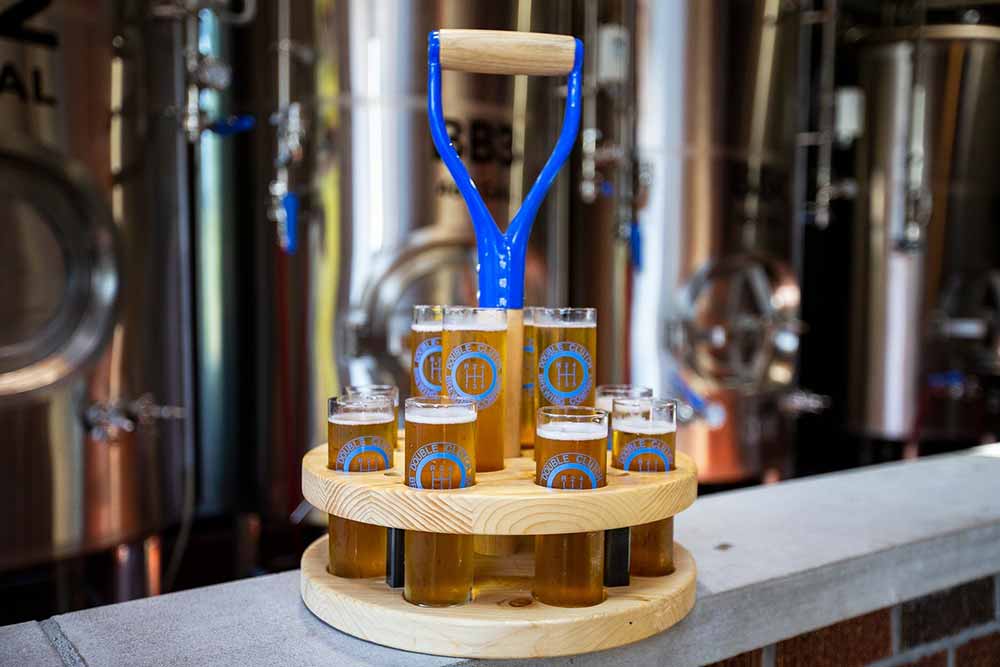
Photography courtesy of @doubleclutchbrewery
Opened in October 2021, Double Clutch hosted its first kölsch service in April of last year. Inspired by Dovetail’s kölsch service, bar manager Nick Murray told the Chicago Tribune he wanted Double Clutch to try a hand at a version to drum up excitement for the new German-inspired brewery.
We haven’t seen any murmurs of kölsch service recently from Double Clutch, but if you live around the Chicagoland area, follow @doubleclutchbrewery for any upcoming events.
Similar to Dovetail’s approach, Double Clutch also appears to offer $30 kränze of the brewery’s kölsch available daily.
Fair State Brewing Coopeartive
Minneapolis, MN
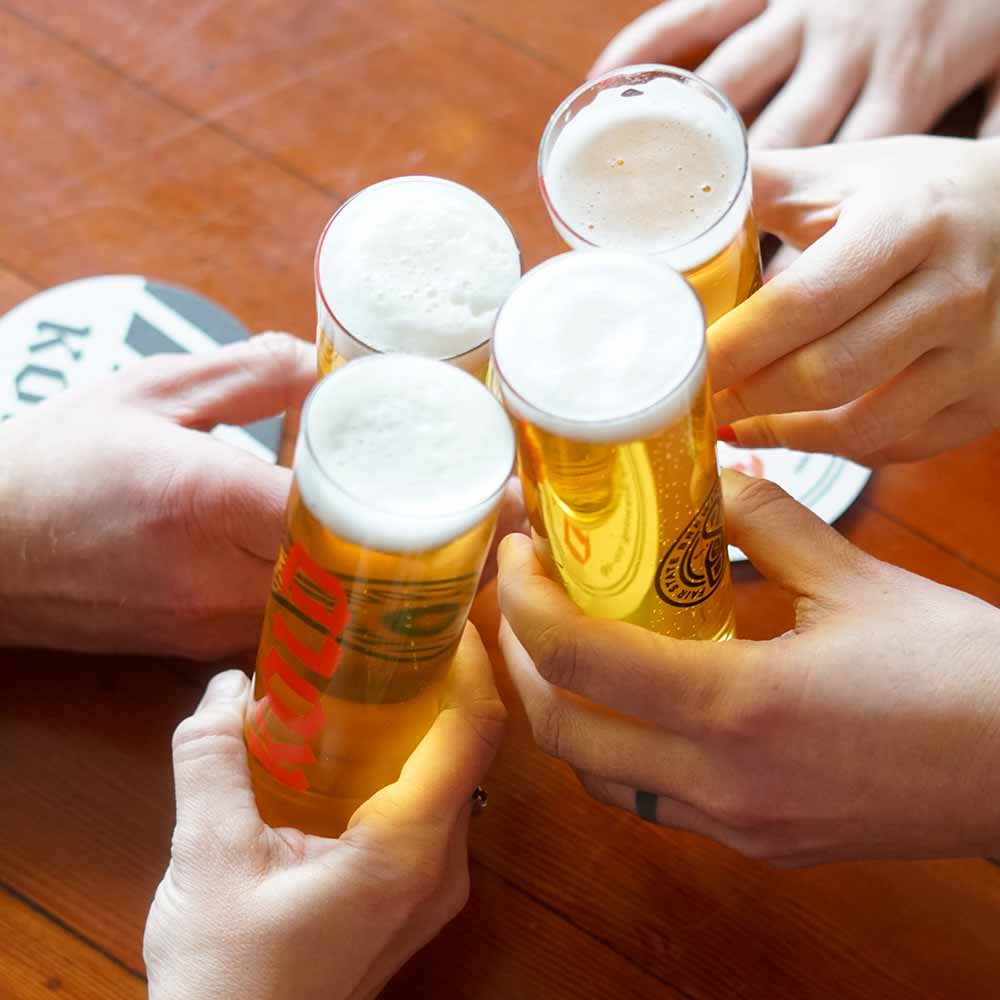
Photography courtesy of Fair State Brewing Cooperative
Making our way slowly across the country, we stop in Minneapolis next on our nationwide tour of kölsch services.
On a recent visit home to Minneapolis, I nipped into Fair State’s taproom. I’d hoped my trip would coincide with one of their individual kölsch nights, but alas, no dice.
Still, you can order kölsch service if you sit at the bar any day of the week. I indulged in a few of Fair State’s KÖLD, a lovely crisp, clean version brewed with German ale yeast, clocking in at 4.7% ABV for ultimate day drinking.
Otherwise, the Minnesota-based brewery’s kölsch days happen every so often, so keep an eye on the brewery’s event page. Looks like the next one will be on September 17th.
With a bit of a spin, on those days at Fair State, you pay a $20 flat rate, take a seat anywhere in the taproom or beer garden, and just enjoy unlimited fresh kölsch to your heart’s content.
Wild Mind Ales
Minneapolis, MN
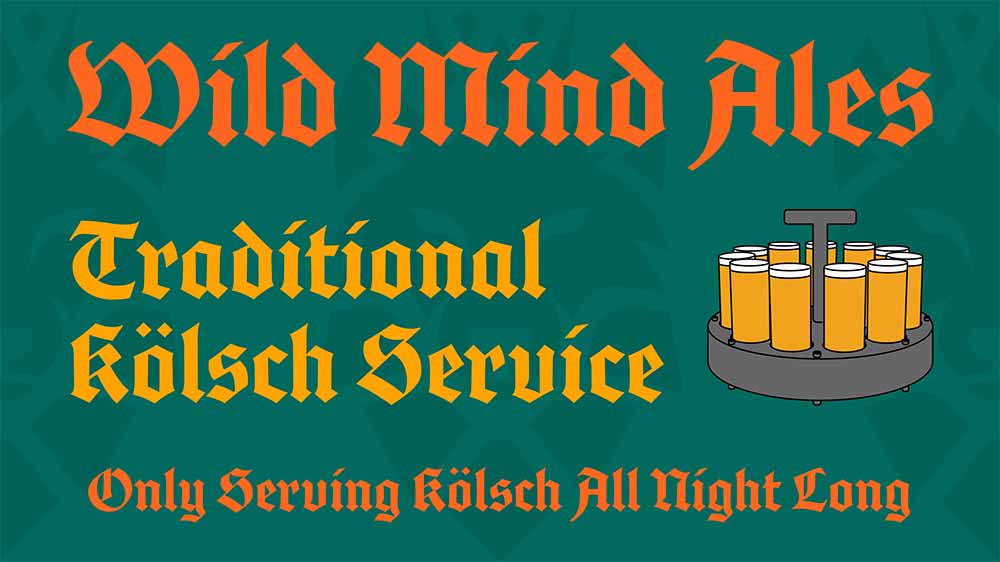
Graphic courtesy of Wild Mind Ales
Another Minnesota brewery that approaches kölsch service as a one-day event, Wild Mind Ales keeps things traditional by serving kölsch all night long.
Featuring the brewery’s kölsch-style ale called Balance of Time, a kölsch night at Wild Mind Ales showcases the beer in small 0.2L stangen brought to you table side from a köbe carrying the traditional kranz.
You never need to go back to the bar to order. As with others on this list, fresh, cold kölsch just appears in front of you thanks to the hardworking, hawk-eyed servers walking the aisles.
You close out traditionally by taking your marked coaster to the bar.
It looks like Wild Mind Ales last held a kölsch service on July 31, 2023, so stay tuned here for the next one.
Dual Citizen Brewing Company
St. Paul, MN
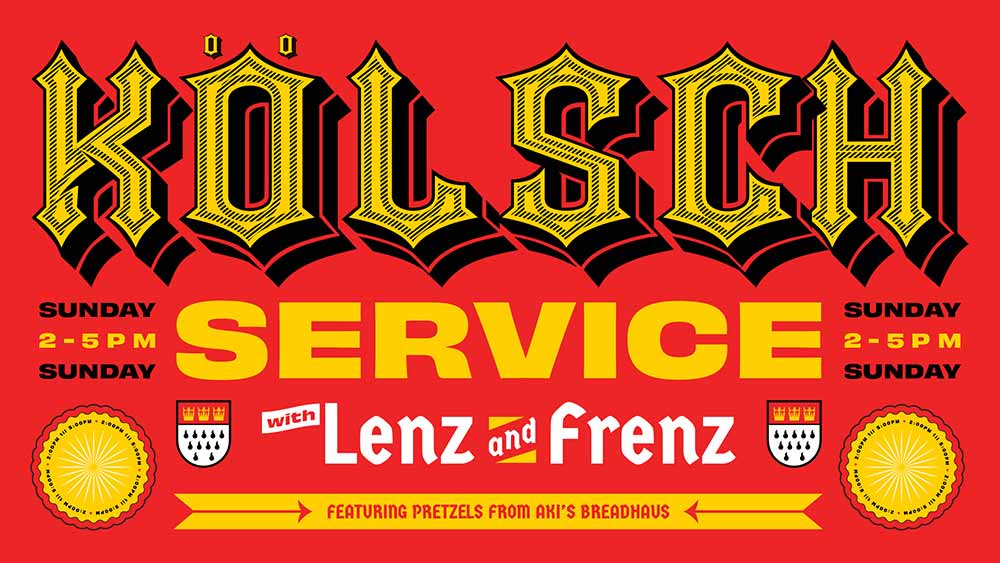
Graphic courtesy of Dual Citizen Brewing Company
Happening on select Sundays from 2 pm-5 pm, Dual Citizen’s kölsch service takes cues from those in Köln.
Slim glasses of Elbow Bender kölsch flow until you’ve had your fill. Smartly, Dual Citizen pairs its Sunday Kölsch Service with warm pretzels from the well-known German-inspired bakery Aki’s Breadhaus, plus live bluegrass music from Lenz and Frenz.
Grab a bunch of friends; you can’t miss this kölsch service.
Dual Citizen hosts its next kölsch service on Sunday, September 10th, but keep the brewery’s event page bookmarked so that you can stay up to date with all the future kölsch nights.
Halfway Crooks Beer
Atlanta, GA
Heading to the South, we find a slew of other breweries around the Atlanta area offering kölsch service. Renowned lager maker (of both beers and famous merch), Halfways Crooks embraced its own iteration.
The brewery throws an entire annual festival—Halfway Crooks Kölsch Fest—in April, honoring the beer style from Köln and traditional kölsch-style service.
It’s rare to see a brewery dedicate an entire fest to kölsch service, so we can only hope Halfway Crooks continues to bring back this event in the years to come (and that we’re magically in Atlanta for one of them).
Good Word Brewing & Public House
Duluth, GA
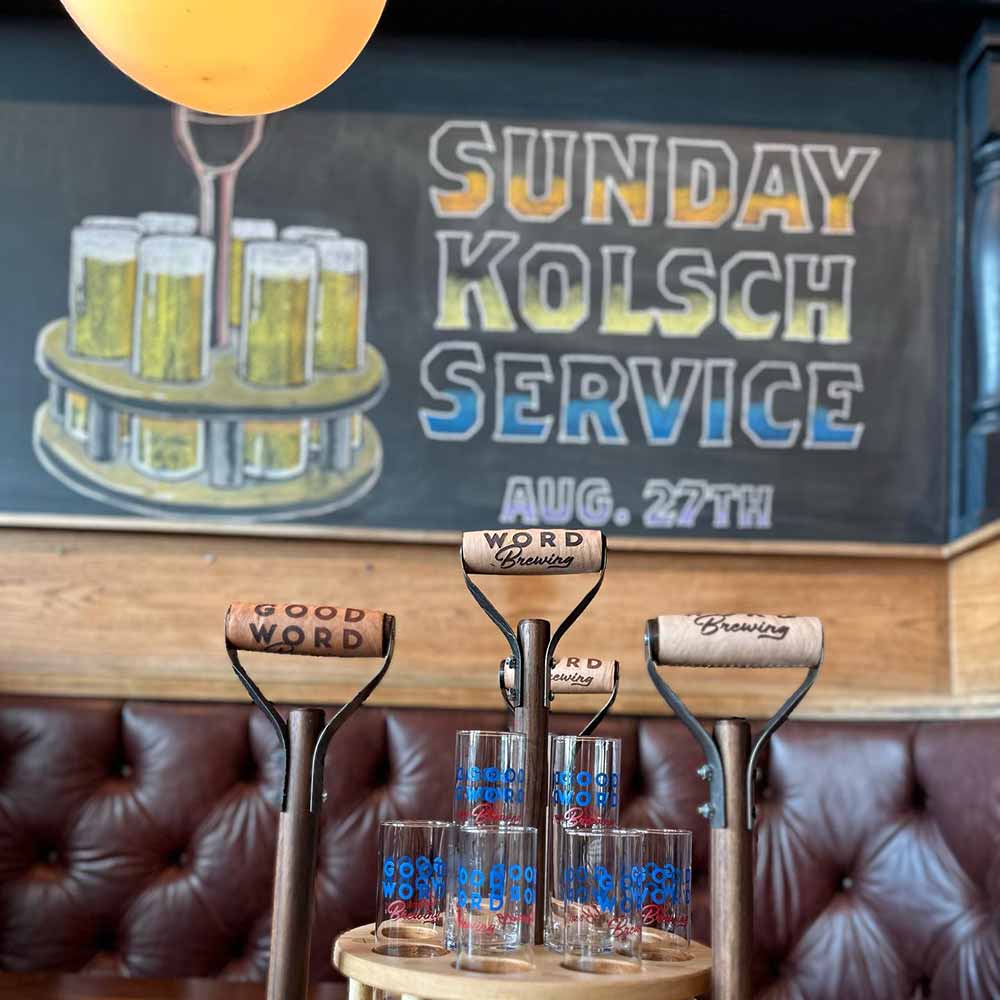
Photography courtesy of @goodwordbrewing
Once a month on Sunday, Good Word skips its brunch, replacing it with traditional kölsch service.
At the moment, the Duluth-based brewery’s rendition features At the Altar of the Sun, a traditional 4.6% ABV kölsch-style ale fermented with kölsch and lager yeast at 52F.
The service style is completely traditional and features these beautiful Good Word branded kränze.
Keep an eye on Good Word’s Instagram (@goodwordbrewing) for the next sub-brunch-tag-in-kölsch installment.
Inner Voice Brewing
Decatur, GA
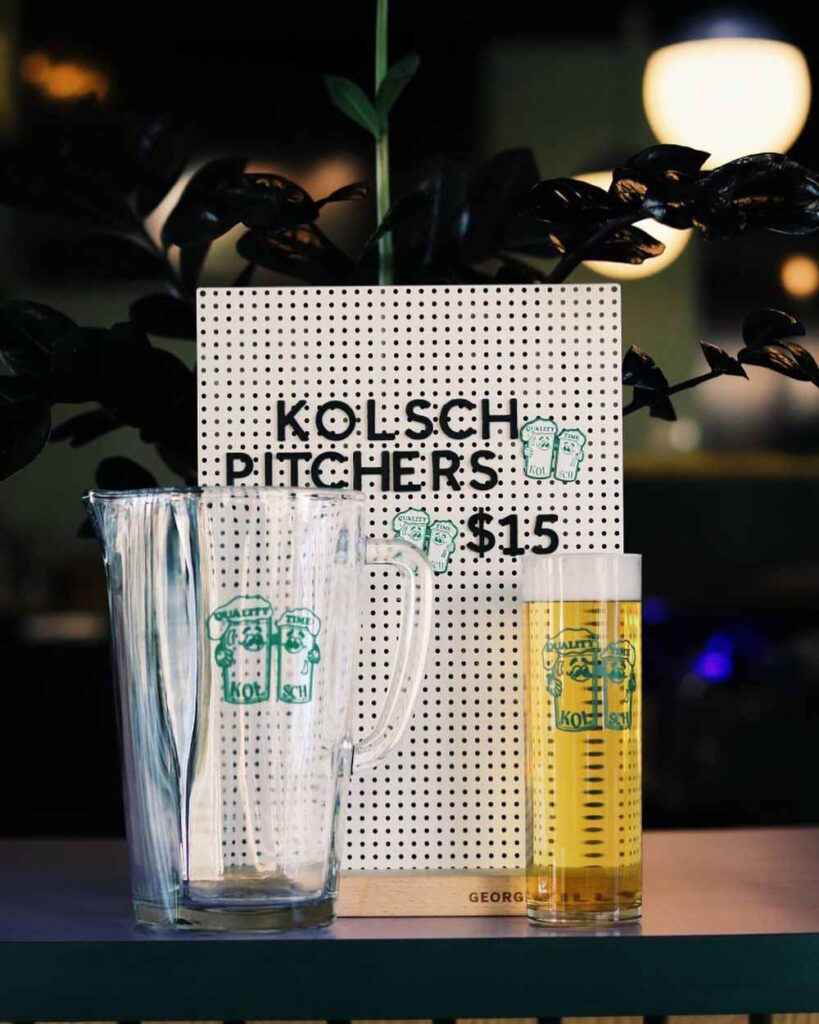
Photography courtesy of @innervoicebrewing
Perhaps the most unique and certainly the most tongue-in-cheek adaptation on this list, Inner Voice offers what they call “self-service kölsch service.”
Available on Tuesdays and Sundays, Inner Voice lets you order “big glasses with a handle,”, i.e., what we Americans who’ve spent time in dingy bars call … a pitcher. For $15, the brewery fills said pitcher to the brim with its Quality Time kölsch, gives you much smaller glasses, and lets you refill your glass as needed.
Blackberry Farm Brewery
Maryville, TN
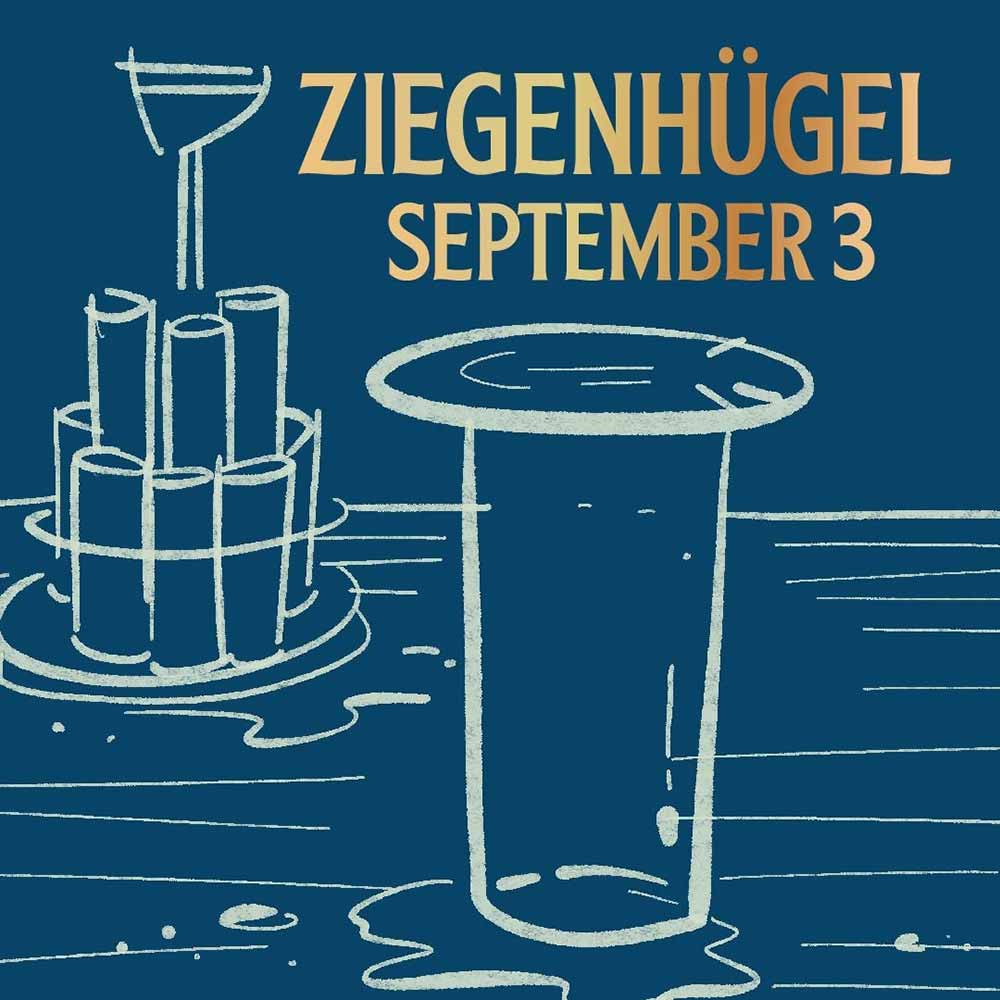
Graphic courtesy of @blackberryfarmbrewery
Making our way up the East Coast, we stop in Tennessee for Blackberry Farm Brewery’s iteration of kölsch service. We got a tip from Muñoz to look into this one.
A monthly traditional kölsch service, Ziegenhügel at Blackberry Farm Brewery combines two German words—ziegen, meaning goat, and em>hügel, translating to hill, for a new term nodding to the brewery’s kölsch-style ale, Goat Hill.
At Blackberry Farms Brewery, grab a coaster and get $2 Goat Hill during Ziegenhügel, along with German food.
Holy Grale
Louisville, KY
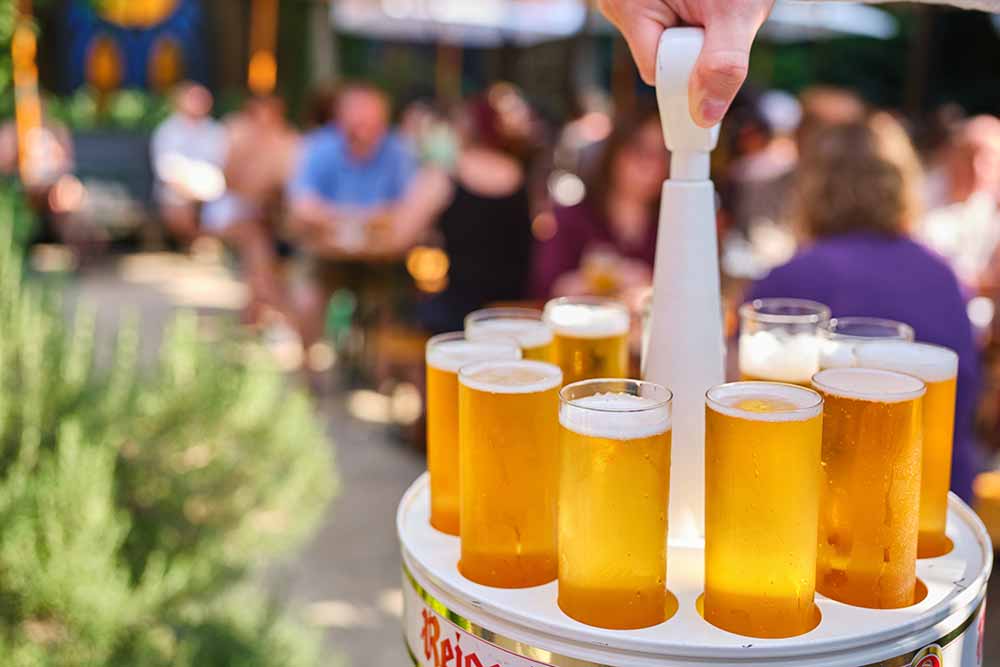
Photography courtesy of Holy Grale
The first bar we’re featuring on this list to offer kölsch service, we discovered this one, as you’ll remember, from Fritz Family Brewers Co-Founders Kelly and Cory Buenning.
Every Thursday in Holy Grale’s “gralegarten,” you can enjoy Köln-style kölsch service with bottomless stangen of Reissdorf Kölsch.
Here’s what’s cool about kölsch service at a bar: They’re not beholden, like a brewery, to serve their kölsch. Instead, at Holy Grale, you’ll find a kölsch straight from a 129-year-old brewery in Cologne, Germany.
As Holy Grale quotes on its website from renowned beer writer Michael Jackson, “Light, soft, and delicious … with a minty, hop aroma; sweet, vanilla-like, malt flavors; and a crisp, dry, cedary finish. A delicious Koelsch.”
Triple Crossing
Richmond, VA
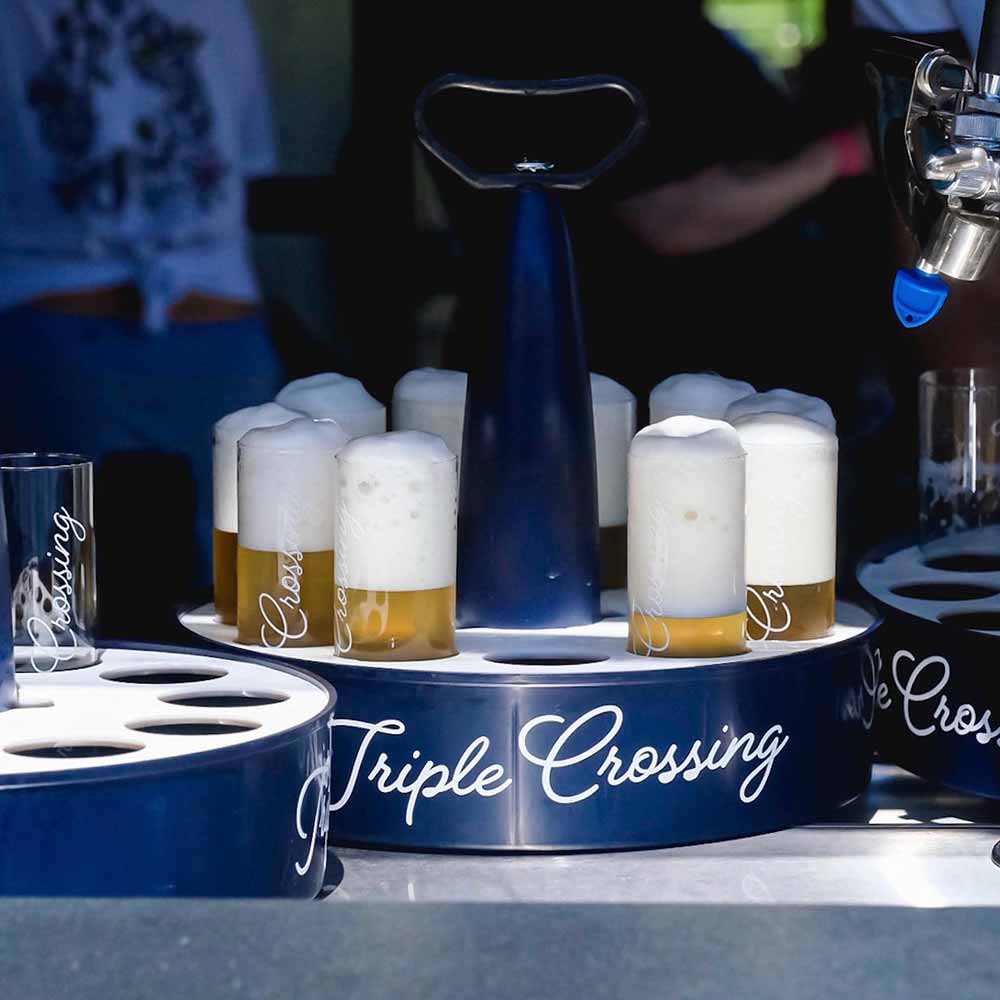
Photography courtesy of @triplecrossing
Much like Halfway Crooks in Georgia, this popular Virginia-based brewery hosted an entire Kölschfest this year in late July. Over two days, Triple Crossing offered kölsch service in the taproom with $10 coasters that included four pours of kölsch. Here’s to hoping Triple Crossing brings back Kölschfest next year.
Tørst
Brooklyn, NY
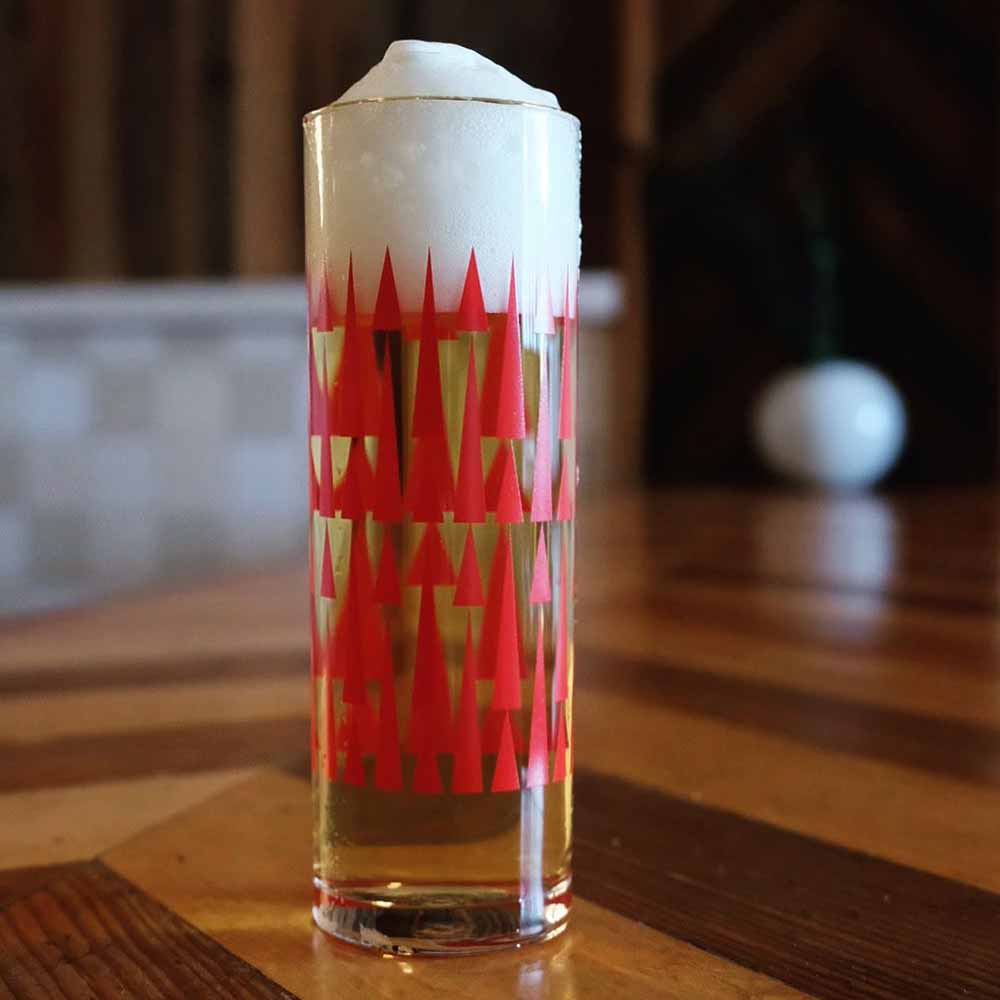
Photography courtesy of @grandpajack024
We’re making our way into the Mid-Atlantic, stopping in New York for this famous craft beer bar’s translation of kölsch service. Offered on Mondays, Tørst will give you $5 pours of kölsch in 0.2L glasses until you say stop. Last Monday, the elite watering hole featured Reissdorf Kölsch, just like Holy Grale.
Notch Brewing
Salem, MA
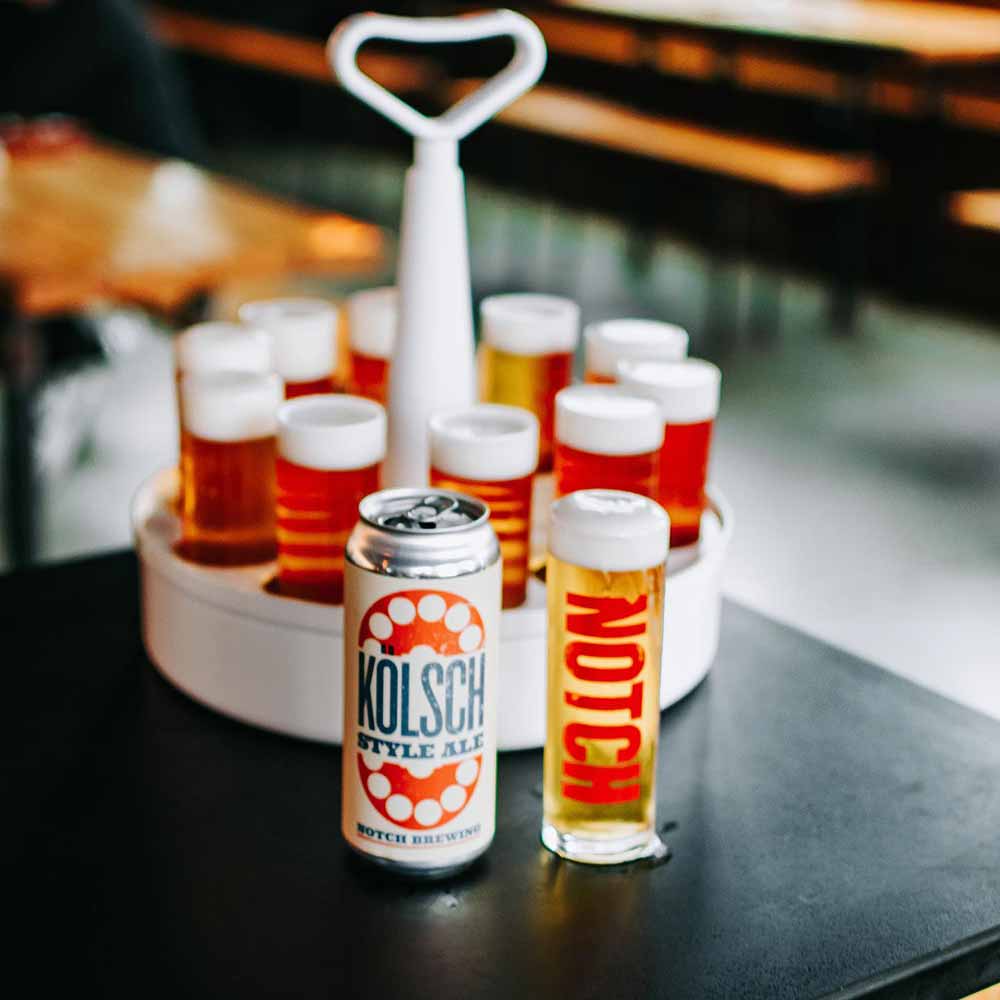
Photography courtesy of @notchbrewing
A beloved event at Notch, Kölsch Night turned into Kölsch Day last year, featuring a full day of all kölsch, all day.
You don’t need a ticket, and you don’t pay an admission fee. You just show up, drink as much kölsch as you want during a traditional service, and pay for the notches on your coaster at the end.
It doesn’t appear that Notch has any kölsch events planned soon, but stay tuned to the brewery’s event page for potential upcoming kölsch days.
Homage Brewing
Pomona, CA
To celebrate it’s new beer, Jupiter Kölsch, Homage Brewing will be offering kölsch service at its bar during slower hours. According to this Insta post, “We’ll simply place a coaster in front of you, serve your first glass, and you tell us when to stop refilling by placing the coaster on top of your glass.”
Bow & Arrow Brewing Co.
Albuquerque, NM
In a lead up to celebrating its eight anniversary, Bow & Arrow its own version of kölsch service, which appears to stay pretty traditional. Although you do need to buy a $20 ticket, but that will get you early access to try Bow & Arrow’s new Southwest Society Kolsch and a stange that you get to keep! Check out Bow & Arrow’s IG post for more details.

